ARCHIVE: This material is no longer maintained and should be viewed for reference only
New online toolkit helps teachers improve classroom talk
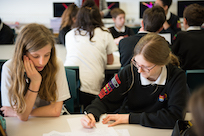
Role of play in education explored at international Faculty conference
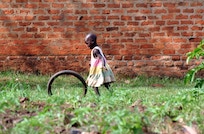
Notes:
Find the livestream here throughout the day: https://www.youtube.com/watch?v=8XXIiM9PW8E
Top award for Uni of Cam Primary School learning coach

Schools across Kazakhstan adopt Faculty-designed teacher development model
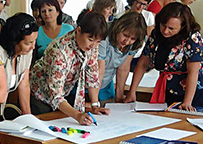
Research Lesson Study was devised by Dr Pete Dudley, a lecturer at the Faculty. Building on a system used in Japan since the 1870s, RLS is a highly specified form of classroom action research focusing on the development of teacher practice knowledge. It involves groups of teachers collaboratively planning, teaching, observing and analysing learning and teaching in ‘research lessons’.
Leading teacher educators from the Nazabayev Intellectual Schools (NIS) programme in Kazakhstan attended a workshop led by Pete to further develop their use of his model. RLS
was implemented in the first tranche of NIS schools to work with the Faculty and has proved successful and popular with teachers and school leaders.
The Kazakh government has developed RLS training and support materials which are already in use in the Central Asian state's 7000 schools, supported by 1000 school-based Lesson Study local leading teachers. The government now wants to expand the programme further.
The workshop focused on dialogic approaches to optimising the outcomes of teacher learning in RLS through ensuring that 'ground rule'-informed, exploratory teacher talk maximises potential for 'meaning oriented teacher learning' (how to improve the learning of pupils in research lessons and subsequently in the curriculum). It also highlighted observation and data management skills; evaluating the impact of lesson studies (locally and at scale), and on using the outcomes of lesson studies to inform policy. There was a further focus on supporting school leaders in implementing RLS.
Pete said: “The progress that has been made in the development and use of lesson study in Kazakhstan is tremendous and the quality of the work and its popularity are high. This is down of course to the passion, energy and rigour of Kazakhstan's teachers and the national and regional teams, but equally to the skill and dedication of all those from the Faculty who have supported the NIS work in recent years.”
Cambridge University bursaries boost students’ academic performance and reduce anxiety, study finds
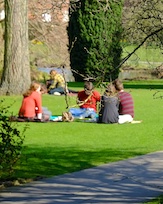
Researchers compared students’ views gained through surveys and interviews with an analysis of data related to drop-out rates, class of degrees awarded and graduate employment, using a methodology developed by higher education regulator the Office for Students.
“Across all of our analyses we found evidence that broadly speaking, the Cambridge Bursary Scheme operates as intended, with very few, if any, differences in outcomes by students’ economic background.
“This is something we will be looking at as a matter of urgency. We do not want anyone who has the ability and drive to thrive here to rule out Cambridge on the basis of cost.”
The Cambridge Bursary is non-repayable and automatically awarded to students from households which meet an income threshold (initially set in relation to the threshold for maintenance grant eligibility), as long as students report this income to the Student Loans Company and indicate that they would like to receive the Bursary. The upper threshold is currently £42,620. Any eligible student with a household income below this threshold qualifies for the Cambridge Bursary, paid on a sliding scale. Currently, the maximum Bursary is £3,500 for the 2018/19 academic year and is awarded to eligible students whose household income is below a £25,000 threshold. Students with household income between £25,000 and £42,620 receive a partial Bursary.
This information is available on the University’s undergraduate web portal: https://www.cambridgestudents.cam.ac.uk/cambridgebursary
Faculty team part of £20m UK research drive to assess benefits of EdTech
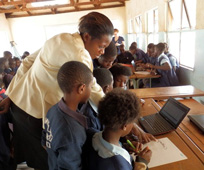
The Educational Technology (EdTech) Research and Innovation Hub, funded by the Department for International Development (DFID) in partnership with the World Bank, brings together researchers, technology companies and education experts to identify the tech-based interventions that work best in poorer countries.
The consortium awarded the grant includes a team from the Research for Equitable Access and Learning (REAL) Centre in the Faculty of Education at the University of Cambridge, led by Dr Sara Hennessy, one of the six directors of the Hub. Other members of the Cambridge team include Dr Ricardo Sabates, Professor Rupert Wegerif, Dr Nidhi Singal, Dr Riikka Hofmann and Dr Rob Gruitjers. Dr Björn Haßler, a REAL Centre associate member, is also a director of the Hub.
The aim of the Hub is to create the largest global body of research on how EdTech is being used and how it can be improved, for the benefit of pupils, teachers and governments.
One of the major challenges for education technology is that, while some governments and schools have focused on buying hardware and software, these tools are often not deployed as part of a joined-up wider initiative. Technology is often introduced into classrooms, for example, without opportunities for teachers to learn how to use it to support children’s learning. A glut of pilot projects means that any change is rarely sustained. The Hub instead aims for long-term, system-level change across whole regions.
EdTech is also too often poorly designed for the context in which it is being used, frequently hindered by lack of infrastructure. All of this means that EdTech investments can be costly and yet not lead to much-needed educational improvement for children in disadvantaged regions.
Education systems in many developing and conflict-affected countries struggle to make progress on basic literacy and numeracy, and more than 380 million children worldwide will finish primary school without being able to read or do basic maths. The UN’s Sustainable Development Goal for education aims to ensure that, by 2030, all girls and boys complete free, equitable and quality primary and secondary education.
The EdTechHub, which will receive £20 million from DFID and run for eight years, is made up of the Overseas Development Institute, University of Cambridge, Results for Development, Brink, Jigsaw, Open Development & Education, Afrilabs, e-Learning Africa and BRAC.
Dr Hennessy said: "This huge investment and sustained commitment by DFID and partners to improving the educational opportunities for disadvantaged children in key low-income regions is extremely welcome.
“The University of Cambridge is very pleased to be involved in this pivotally important research programme that will make a real difference on the ground. The EdTechHub remit sends out a strong message in tune with our understanding that technology cannot just be parachuted in and magically transform lives.
“Effective engagement has to be long-term, strengthening communities of practice and supporting the most effective teaching and learning strategies. Technology use has to be adapted to the cultural context and one-size-fits-all solutions simply don’t work. Rather than hoping for the best, we have to carefully review and iterate, generating insights from rigorous research and applying them in practice."
Dr Haßler, Director of Open Development and Education, added: “The most disadvantaged children are often taught by teachers who themselves are disadvantaged, including through a lack of educational opportunities. If we want to improve those children’s lives, we also have to think about how to support those teachers.
“This support cannot rely on the often poor and costly internet connections. Instead, we have to find smart ways of utilising what is available including digital and non-digital approaches. Above all, it means listening to those educators and working in partnership.”
As well as assessing the effectiveness of digital tools for pupils and teachers, the EdTechHub will provide a global platform for sharing ideas and effective practice among technology companies, investors and decision makers.
It will also develop a team that will work directly with users to test and tailor tools to the local context, and offer technical assistance to help international governments build up their knowledge and expertise on integrating digital education tools in their countries.
Notes:
The EdTechHub
For more information on the role of the REAL Centre, Faculty of Education, in the consortium, contact Lucy Ward, Communications Manager, Faculty of Education: lw5282cam.ac.uk | 07788 567707.
Syrian higher education system facing “complete breakdown” after eight years of war, Cambridge study finds

The findings, which draw on interviews conducted remotely through secure apps with academics and students still active in Syria, paint a devastating picture of the impact of the war on all aspects of university life. Consequences range from the destruction of facilities and terrorising presence of security forces on campus to the forced displacement of students and faculty members and near disappearance of research.
Syrian Higher Education post-2011: Immediate and Future Challenges, published today [18 June 2019], was commissioned by the Council for At-Risk Academics (Cara), a British charity that helps academics in danger or forced exile, and authored by Professor Colleen McLaughlin with Jo-Anne Dillabough, Olena Fimyar, Zeina Al-Azmeh and Mona Jebril of the Faculty of Education at Cambridge.
A second complementary study out today, The State of Higher Education in Syria pre-2011, also led by Professor McLaughlin and commissioned jointly by Cara and the British Council, provides an overview of the sector before the outbreak of war.
The conflict in Syria has generated the 21st century’s worst humanitarian crisis, with as many as 300,000 Syrians killed and half the population displaced since it began in 2011. Previously, Syria boasted one of the Middle East’s largest and most well-established higher education systems. Not only has the war decimated the university system within the country, but the refugees who have fled are estimated to include 2,000 university professionals and at least 100,000 university-qualified students.
The new report identifies three clear and damaging trends in the Syrian higher education system, many elements of which existed prior to 2011 but have all been exacerbated by the conflict. Most fundamental is the heightened politicisation of the sector through a variety of means, many involving violence. “These include corrupt governance structures, the militarisation of students and university practices, and a much stronger security apparatus leading to the fragmentation and/or complete breakdown of HE,” the study says.
Human rights violations including detention, patronage, disappearances, displacement
and murder are changing the demographic make-up of higher education, it adds, and have led to the social distrust of HE institutions as capable of educating students into the future and the targeting of academics as a particular threat.
One academic interviewed for the study said: “In 2012 I heard from my colleagues in our laboratory that there were soldiers who came to our university, broke down the doors, destroyed everything and hit everybody there because they had protested against the regime. Another recalled: “One of the professors was dragged away by two security officials in front of the students. That professor was taken to prison and charged because of his political views.”
The general atmosphere within universities was of pervasive fear, in which ‘anyone working at the university is stopped from communicating with anyone outside,’ a third interviewee reported.
Meanwhile, political realignment has become a major obstacle to broad forms of internationalisation and collaboration – the lifeblood of higher education. Regime-controlled universities have had to curtail their links with Western universities, the researchers found, while reinforcing collaboration with countries supportive of the regime, including Russia, Iran and China.
A second trend identified by researchers was the academic impact of the civil war, including curriculum stagnation and the disappearance of research. “The conflict has resulted in massive losses of both HE expertise and HE infrastructure,” says the study, with already-limited university funding diverted towards the conflict and public spending on higher education per head well below the OECD average.
Government control over the content and delivery of curricula has increased in areas controlled by President Bashar al-Assad’s regime, and there is more dependence on rote learning and outdated textbooks. Teaching quality has fallen as experienced qualified staff are lost and replaced by untrained recent graduates, and reports of bribery, cheating and false certification are rife, with corruption “threatening the integrity of HE”.
Research, already limited pre-2011, has “all but disappeared”, driven out by lack of funding and the near-impossibility of field research, the study says.
The third and final trend highlighted in the report is the impact of the conflict on students’ experiences. While access has increased as admission requirements have been lowered to counter lower applications post-2011, attrition rates have “soared” because of personal safety fears, poverty, fear of detention and internal displacement. Education quality has diminished as funding falls, with staff often unavailable and buildings unusable, coupled with disruption to water and power.
In a series of recommendations, the report calls for action from the United Nations, NGOs and the broader international community to depoliticise Syrian higher education and develop and implement “high standards of academic freedom and associated forms of accountability”. While it is important that university students and staff should be kept safe, national security personnel should be withdrawn from campuses and replaced with civilian security personnel trained in conflict reduction and peace-building approaches, the study says.
International partnerships with other Middle Eastern, Western and European universities should be developed. “Standards of transparency, autonomy, freedom and cultural and political pluralism … will be crucial to any post-conflict Syrian HE sector,” researchers conclude.
The report’s findings were drawn from existing academic research and “grey” literature such as news and NGO reports, together with 117 remote interviews with university staff and students still in Syria conducted by compatriot academics in exile, focus group discussions and personal testimonies from 19 Syrian academics living in exile in Turkey.
Professor McLaughlin said: “The key researchers here were the Syrian displaced academics CARA was working with. This collaborative research project was challenging to undertake given the context. The results are important, and so is this way of collaborating. CARA’s work to support Syrian displaced academics is vital and we need to remember and honour their work as well as continue to support research into the reality of Syrian higher education.”
Stephen Wordsworth, Executive Director of Cara, said: “Cara’s regionally-based Syria Programme provides opportunities for Syrian academics in exile to work collaboratively with their counterparts in UK universities and elsewhere, to maintain and develop their skills and experience in preparation for the day when they can return home to help re-build the system of higher education in that country.
“Today’s study shows very clearly the damage that has been inflicted since 2011, and what needs to be done to start to put things right again. We are immensely grateful to all the Syrian academics who contributed, and to Colleen and her team for their inspirational leadership of the project.”
Notes:
The two reports (English version) can be found here: http://bit.ly/SyriaHE
Syrian Higher Education post-2011: Immediate and Future Challenges, produced by researchers at the University of Cambridge Faculty of Education, in collaboration with Syrian co-researchers, for the Council for At-Risk Academics (Cara).
The State of Higher Education in Syria pre-2011, also produced by researchers at the University of Cambridge Faculty of Education, was commissioned jointly by Cara and the British Council.
Arabic and English versions of the two reports can also be found on the Cara website
For further information, contact:
Faculty of Education, University of Cambridge:
Lucy Ward, Communications Manager: lw528@cam.ac.uk | 07788 567707
Professor Colleen McLaughlin: cm10009@cam.ac.uk
Council for At-Risk Academics (Cara):
Stephen Wordsworth, Executive Director: wordsworth@cara.ngo | 07903 786659
Syrian Higher Education post-2011: Immediate and Future Challenges details a collaborative enquiry, carried out by Syrian academics in exile in Turkey and academics from the University of Cambridge Faculty of Education, into the state of Syrian higher education (HE) post-2011. It was designed as a learning activity and a collaborative study and included two capacity-building workshops on data collection, research ethics and qualitative research methodologies run by the Cambridge research team members for their Syrian colleagues. Each contributed their unique knowledge, understanding and expertise to the undertaking, critical to which was the Syrian co- researchers’ reach back to former university colleagues and students still active in HE inside Syria. The Syrian and Cambridge team members jointly conducted the enquiry over a 12-month period, between 2017 and 2018.
Bereaved children missing out on vital support in schools, Cambridge study finds

Voices of adults bereaved as children; Colleen McLaughlin, Martin Lytje and Carol Holliday. June 2019
University teaching “limits students’ curiosity” – Faculty Head
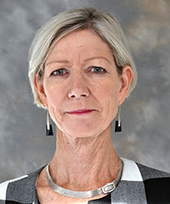
Addressing the Eighth Eurasian Higher Education Leaders’ Forum, held at Nazarbayev University in Astana, Kazakhstan, Prof Robertson called for a shift in higher education to embrace broader approaches to knowledge and learning in order to meet twenty-first century needs.
Universities should abide by a new set of values to bring about social change, she told the forum. They should, “assume collective responsibility, form constructive partnerships, draw on full range of knowledges of past, present and future, and believe we can all learn with and from each other over the life-course.” Too often, university study was concentrated on 18-25-year-olds, added Prof Robertson, a Professor of Sociology of Education whose research focuses on education in a political context, including the ways education has developed to help service the economy.
The forum, attended by leaders of education, business and government organisations from the Eurasian region and worldwide, took as its theme, “Future-Ready Graduates”. The event focused on the readiness of higher education institutions to prepare students for the changing nature of the labour market, and on universities’ capacity to develop future leaders and good citizens.
Prof Robertson said the traditional model of university teaching too often limited students’ “criticality, curiosity, collective problem-solving and learning to fail”. In order to prepare graduates to address global challenges such as climate change and income inequality it was important to move beyond single discipline-based problem-solving and even trans-disciplinary approaches involving a diverse range of specialists.
A new, third, approach would ask what choices were available in the context of broader technological change, would seek to reimagine the alternatives to those promoted as inevitable, and would question who is recognised as participating in the present and future.
“If we are to imagine new ways of living and acting, then we must be capable of assessing and bringing about social change guided by a set of values,” Prof Robertson told delegates.
Three new Professorships as Faculty academics gain promotion

Dr Nidhi Singal, whose research focuses on educational inequity among marginalised groups in Southern contexts, including the experiences of children with disabilities, is promoted to Professor, together with Dr Cathy Burke, an expert in the history of education and childhood. Dr Andreas Stylianides, a mathematics education specialist whose research is committed to understanding and acting upon problems of classroom practice, also becomes a Professor. Dr Shawn Bullock, whose work uses the lenses offered by the history and philosophy of science and technology to examine issues in education, and Dr Yongcan Liu, an expert in second language teaching and the schooling experience of bilingual migrant children, have been promoted to Reader. Three members of the Faculty were appointed to Senior Lectureships. Dr Riikka Hofmann’s research focuses on leadership and professional change in educational and medical settings and on classroom learning and dialogue, while Dr Jenny Gibson’s research interests lie in the interplay between linguistic and social development from childhood through to adolescence. Dr Ros McLellan explores student motivation, wellbeing, mathematics anxiety, and creativity. Many congratulations to all eight on this wonderful achievement.
Professor Anna Vignoles awarded CBE in Queen’s birthday honours
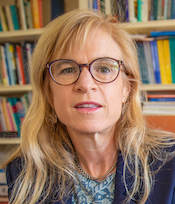
Anna is holder of the 1938 Chair in the Faculty of Education, University of Cambridge, and a Fellow of Jesus College. She is also a Fellow of the British Academy and a member of the council of the Economic and Social Research Council.
Her work focuses on ways both to improve social mobility and ensure people have the skills they need for the modern labour market. Her research using big data to illuminate the very unequal educational and economic outcomes for children growing up in different family circumstances has been highly influential, informing government policy and helping shape public debate.
Working with colleagues at the Faculty, Anna also leads nationally-significant research into how well the education system is meeting the needs of both individuals and the wider economy, including the vocational skills sought by employers in addition to academic qualifications.
Her work has produced important recommendations on ways to reduce the large socio-economic inequalities in educational achievement in the UK.
Head of the Faculty of Education Professor Susan Robertson said: “This is wonderful recognition of Professor Anna Vignoles’ contribution to our different
communities”.
Read our interview with Anna:
Many congratulations on your award! How does it feel to receive an CBE? I’m particularly delighted to receive this honour as it recognises the important work that we do at the Faculty of Education on understanding and trying to reduce the inequalities we see in individuals’ educational opportunities, and indeed their life chances in general.
We have a wonderful and highly multidisciplinary team committed to both researching these issues and then putting that research into practice to make a difference in children and young people’s lives. I’m particularly grateful to Dr Sonia Ilie who leads on the work we do on widening participation in Higher Education, which is a major priority for Cambridge, as well as the many colleagues who I work with in our two research centres that address inequalities in early childhood education (PEDAL) and in some of the poorest countries of the world (REAL).
Tell us about your career. Were you always an academic? No - the start of my academic career came when I was up in the North East. I had graduated in Economics from SOAS and was working in human resources, recruiting shop floor workers for a factory in South Shields.
We were using modern methods, psychometric tests, literacy and numeracy tests. It was actually a very hi-tech factory producing computer chips. And it really brought home to me the gulf between the kinds of skills that they wanted for their shop floor workers and the kinds of skills that many of the applicants - particularly men who'd been laid off from shipbuilding - actually had. I got really interested in labour markets and then was fortunate enough to be offered a PhD to study them at the University of Newcastle with Professor Peter Dolton, who was an amazing mentor. So I'm actually a labour economist.
What were your next academic steps? As my career progressed I went to work at the London School of Economics, and there I became more interested in education specifically as one particular aspect of the labour market. Eventually, in 2001, I decided that I wanted to completely specialise in education and I joined what is now UCL IoE.
You came to the Faculty in 2012 as Professor of Education – what drew you here? One of the attractions of coming here was the really interesting mix of different disciplines in the Faculty. And I like to think that, since I've arrived, we've also built up our expertise in the analysis of quantitative data. We'd always had a huge strength on the qualitative side and we had some fantastic professors here on the quantitative side but our group has grown from strength to strength.
Is it the data that fascinates you or a drive to tackle the inequality you identify? When you study things from an economic perspective, I think it's really clear that over a long period of time now, what has been really valued are cognitive skills - basically the kinds of skills that you get through academic achievement. And at the same time we were also expanding education. More people now go to university for example.
But I'm also driven by methods and data in the sense that I think there's still much more we can do in education research to be as rigorous as we possibly can be. And that's always excited me: the idea of using better quality data, thinking about really good theory and lots of good methods of analysis.
One of the issues that emerges from your research is how you have an outcomes gap between people who've had precisely the same educational opportunity but differing socio-economic backgrounds. Does that mean there's a limit to what education can do? Even if access to education was entirely equal and fair, education is not the only thing that determines people's success. We are definitely seeing that people from more advantaged social and economic backgrounds do better in the labour market. And the thing about economics is that we want to understand why. It's not enough to say, ‘of course it's a private school effect’ or ‘of course it's the effect of being well-connected’.
What we want is rigorous evidence on why is it that people from rich backgrounds get more from their education, get better outcomes even when they've got the same education level as someone from a poor background.
We really need to understand it because if it's a pure network effect then the solutions look quite different from if, say, it’s that students from rich backgrounds also have a set of other skills that the labour market really wants - social skills for example. The solution for that looks quite different, because it suggests that in the education system we should be worrying a lot about the broader skills that people need as well as the academic skills.
Perhaps it's something the education system can't solve – is it a case of the wider playing field being rigged? It can be straight out discrimination, absolutely. But I think the contribution that economics of education makes is to actually really try and understand that. I don't think it's helpful to assume it's discrimination because it could be that there are actually drivers underneath this that we can fix.
So one suggestion we're looking at at the moment is whether the labour market favours those who can take longer to find the right job. In other words, if you can have the luxury of a really extended job search funded by your parents, do you end up in a better job? Probably yes. Particularly if you take unpaid internships.
So what are the policy solutions? Well, one, we should discourage unpaid internships but also we might need to think about how universities and others help students in that difficult transition into the labour market to make the best possible use of the skills they have. I think I'm quite solution-driven: that's the bit that interests me.
How can the University of Cambridge best ensure all potential applicants have a fair chance? Cambridge is really focused on what it can do to genuinely widen access to a wider range of students but crucially we are also trying to do it in a way that's really evidence-driven. We've had a lot of support here at the Faculty from the university itself and crucially from the colleges to try and build a rigorous research agenda around what it is that we can actually do to widen participation.
How does your work link up with other parts of the university? One example is our work with the Cambridge brain sciences unit, looking at resilience and understanding how many children who have difficult lives with adverse things happening to them in early childhood do still go on to do well and thrive.
Finally, tell us what receiving this honour means to you personally. The letter letting me know was sent to the wrong number on our street so I got it two weeks late: I did actually wonder whether they’d got the wrong person until my husband pointed out that it was unlikely there would be another Vignoles. So yes, we all suffer from imposter syndrome – I certainly do. I think actually that if you don't that's probably not a good sign!
I was absolutely delighted, as was my family and particularly my husband who has supported me hugely throughout my career. And my mother, who died last year, would have been very proud. She left school at 17 without a degree or anything: she was a very smart woman but she wasn't particularly highly educated as many women at that time weren’t.
She became educated in later life: she enrolled in the Open University. I was going through her things the other day funnily enough, and I found her degree award from the OU which was dated 2016. My grandma also went back to the University of Essex when she was in her late 60s and she had also left school really young at 16. So I’m from a family of women who clearly valued education and perhaps that set me on my path.
Interview by Lucy Ward, Communications Manager, Faculty of Education.
For more information, contact Lucy Ward: lw528@cam.ac.uk; 07788 567707
Award for book exploring adolescent reading habits across the world

Young People Reading: Empirical Research Across International Contexts, co-edited by Dr Gabrielle Cliff Hodges, a former senior lecturer at the Faculty of Education, University of Cambridge, was runner-up in the United Kingdom Literacy Association (UKLA) Academic Book Award 2019. Five of the ten chapter authors are former PhD students from the Faculty.
The judging panel commended the book for its ‘invaluable global perspective on adolescent readers’. It focuses on empirical research with young people aged 12-21, examining young adult reading choices within and beyond school and university curricula. The ten chapters explore research in different international contexts using a range of methodologies and methods.
Young People Reading is unusual for bringing together findings from small-scale qualitative research projects. The prize judges said: “This well written, well theorised, most original volume is a battle-cry for the value of qualitative, empirical, single case study research”.
Using maps at the start of each chapter to identify the diverse research locations, the book offers thought-provoking ideas including insights into the nature of young people’s reading in situations of crisis.
Dr Cliff Hodges said: “One reason why literature may appeal in times of crisis is that it often deals with the very same fears or violence as are affecting the young readers themselves. Reading literature can be particularly supportive because it affords a wider horizon than readers’ own daily lives, enables them to imagine alternative ways of responding to their immediate context and hence provides a way of understanding or reflecting on their experiences.”
Young people took different approaches when choosing what to read, she added. “Some young adult readers choose to read texts which will help them to understand the world around them, whether those texts are about their own context or somewhere completely different. Others, however, prefer not to read literature about war or violence, either because they seek to escape from the state of crisis in which they perceive themselves to be living or because they desire wider
horizons.”
One tentative finding from the various research projects in the book appears to be that different young readers may well respond unexpectedly to the contexts in which they find themselves reading, placing the responsibility on researchers to find out what those differences may be and not simply to make assumptions.
Co-author of the book is Dr Evelyn Arizpe, a senior lecturer in the University of Glasgow School of Education. The five Faculty of Education chapter authors are: Erin Spring (Canada), Nayla Aramouni (Lebanon), Jia Wei Lim (Malaysia), Rebecca Nambi (Uganda) and Su Li Chong (Malaysia). Su Li’s studies were sponsored by her current place of work: Universiti Teknologi PETRONAS (UTP), Malaysia.
The remaining chapters are about young people’s reading in yet other parts of the world: Osman Coban (Turkey), Mireia Manresa (Catalonia), Lucia Cedeira Serantes (Canada), Laura Guerrero Guadarrama with Evelyn Arizpe (Mexico) and Gabrielle Cliff Hodges (England).
• Young People Reading: Empirical Research Across International Contexts (Routledge, 2018)
Parents choose highest-achieving schools over those nearest to home, major study finds
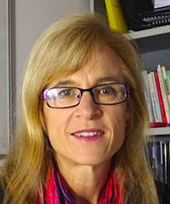
"On average we found parents and pupils usually attempt to try to study at the highest-attaining school, rather than the one which is closest," said Prof Vignoles.
- School choice in England: evidence from national administrative data, Oxford Review of Education https://doi.org/10.1080/03054985.2019.1604332
- For more information, contact Lucy Ward, Communications Manager, Faculty of Education
Education Faculty staff star in Cambridge student-led awards
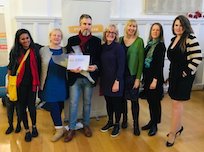
Dr Zoe Jacques, Senior Lecturer in Children’s Literature, and Dr Tyler Denmead, Lecturer of Arts and Creativity in Education, won the Postgraduate Supervisor and Lecturer categories respectively in the 2019 Student-Led Teaching Awards, run by the Cambridge University Students’ Union (CUSU).
Dr Arathi Sriprakash, a specialist in the sociology of education and education policy, and Dr Hilary Cremin, an expert in peace education and conflict transformation, were commended in the categories of Inclusive Practice and Postgraduate Supervisor.
The strength of the Faculty’s teaching and support - and the enthusiasm of our undergraduate and postgraduate students - was resoundingly confirmed in the awards, with a dozen Faculty staff making the shortlist: more than any other faculty or department across the University.
Other nominees included Hannah Ware (Inclusive Practice); Dr Lottie Hoare (Partnership); Dr Nidhi Singal, Dr Ricardo Sabates, Dr Riikka Hofman and Professor Susan Robertson (all Student Support: Academic); and Angela Cutts and Dr Jonathan Padley (Student Support: Non-Academic).
Angela, Faculty Librarian, has the distinction of being the only Librarian nominated for an award.
Top award for student's work on internationalisation in South Korean universities
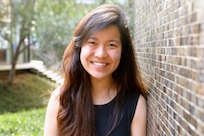
Joyce, who is currently interning at Harvard, said: “I am honoured to win this award, which is a reflection of everyone I’ve worked with in the course of this project. I’m especially grateful to my supervisor, Professor Susan Robertson, whose expertise and advice has been instrumental to the completion of this dissertation. I am also thankful to the Faculty of Education for the valuable tools and perspectives that were so helpful to this project.”
Prof Robertson said: “We extend warm congratulations to Joyce, who is an excellent student. The award represents well-deserved recognition of her work.”
Student wins award to research inequality in access to elite music colleges

Scott, who gave up his own dream of becoming a concert pianist when he felt his social background prevented him fitting in at music college, will pursue his PhD at King’s College London thanks to a LISS DTP studentship. The awards provide funding to support research and training in the social sciences.
Data released by the Higher Education Statistics Agency in 2018 revealed that specialist arts colleges are significantly more likely than the UK average to accept privately-educated pupils. While state school students made up 90% of UK entrants to full-time undergraduate courses in 2016/17, the figure was lower for eight specialist arts institutions. The Royal College of Music drew only 44% of its undergraduates from state schools, while the figure was 65% at the Royal College of Music, 72% at the Guildhall School of Music and Drama and 78% at the Royal Northern College of Music.
Scott, currently completing his MPhil in Educational Research supervised by Professor Pam Burnard, grew up the son of a labourer on a Leeds council estate, begging his parents to fund piano lessons after coming across classical music by watching the BBC Proms. A new piano was out of the question, but he was given a digital keyboard for his eighth birthday and soon began excelling in music exams.
However, he faced bullying and name-calling and his school put him forward for a music scholarship at a nearby private school. He won it, but his family had to turn it down, unable to afford the remaining 70% of the fees. Moving to Leeds College of Music at 16, he then secured a place at Trinity Laban Conservatoire of Music and Dance, only to drop out after seven months because he felt his accent, background and schooling meant he could not fit in.
“My dreams began to shatter in front of my eyes and I became frustrated with how unfair it was that I had to come from this background,” he said. “I was ashamed of myself and I could not understand why my social background was restricting me from doing the only thing that I loved. I developed depression and ended up having a breakdown.”
For five months, he gave up even his beloved piano, before a chance hearing of Liszt’s Liebestraum on the radio one morning lured him back to playing. “I decided I had to do something. I had to stop this from happening to others and I knew to save the music which I loved so much, I needed to help widen participation and make this high art form more accessible.”
Scott returned to his studies, gaining a first class honours degree in the sociology of music education from the UCL Institute of Education. The course led him to the research passion he has begun exploring at Cambridge: the social inequality in access to music education.
He said: “The Faculty of Education has opened so many doors for me and through the MPhil I have managed to further specialise my research whilst gaining a deeper sociological and philosophical understanding. The MPhil is world-renowned and a unique degree. It has truly been a phenomenal experience and all the professors have made my time very memorable.”
• For more information, contact Communications Manager Lucy Ward
Drive to break down barriers marginalising BAME populations in genomics research
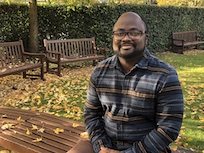
Jerome Atutornu, the first PhD student in the ground-breaking collaboration, is examining ways to redress the disparities in access and engagement of BAME communities with cutting-edge genomic technologies that are revolutionising healthcare.
A radiography lecturer who formerly served in the British army, Jerome will explore attitudes to the technologies among ethnic minority groups in the UK and his native Ghana. The aim is to identify the factors preventing engagement to help pave the way for targeted educational approaches, ensuring no group misses out on the benefits of genomic medicine.
The partnership between the Wellcome Genome Campus, famous for its leading role in sequencing the human genome, and the Faculty, which will award the new PhD, is significant because it brings together both the physical and social science aspects of genomics. The Wellcome Genome Campus Society and Ethics Research group, a team of academics who devised the scheme, works at the interface of science and the public, exploring the ethical, legal and social issues raised by genomics, and is part of the wider Connecting Science programme.
The need to reach out more effectively to BAME communities is driven by concerns that global genetic databases, vital for advances in research and healthcare, are unrepresentative of the world’s population. “The databases are quite skewed towards people of European ancestry,” said Jerome. “As a result, there are concerns that the advantages that will emanate from genomics technologies will not benefit everybody. From an equitable point of view there is a need to involve people from all walks of life.”
A comprehensive and representative range of data is essential for effective research because genetic mutations vary between populations in different locations around the world. For example, sickle cell anaemia, an inherited blood disorder, is more prevalent in Africa than elsewhere as a result of greater exposure to malaria on the continent.
Jerome, who came to the UK from Ghana in 2001, said: “A society like Britain is becoming more multicultural, but Western databases still don’t have enough statistical power to say that from a given population there is perhaps a link between this mutation in this gene to this disease. It’s about trying to capture the whole population.”
The skewed nature of genetic databases has arisen partly because genomic science had developed at first in the West, but also because of specific concerns among BAME populations about handing over genetic information, Jerome said. Ethical abuses such as the Tuskegee syphilis study, in which African American men were denied life-saving treatment so that scientists could observe the full progression of the disease, had prompted suspicion, and some communities feared stigma if their tribe or family were seen as possessing genetic variants that could affect marriage opportunities.
In the UK, he added, one of the foremost reasons given by BAME citizens for not sharing genetic data was “fear of being framed for a crime. It’s the CSI phenomenon – people are getting these ideas from TV.” There were also concerns over the consequences for insurance cover if tests revealed health problems.
As part of his part-time PhD research, Jerome will aim to gain a clearer picture of why BAME communities, and African and Caribbean-origin populations in particular, are reluctant to provide genetic data. One mechanism will be by expansion of an existing public attitudes survey, Your DNA, Your Say, run by the Society and Ethics Research group. Over 35,000 completed surveys, which focuses on public attitudes towards DNA and data sharing, have already been gathered worldwide. Jerome will oversee translation of the survey into two Ghanaian languages, Twi and Ewe, and will work to raise its profile in the UK and Ghana through community radio stations and churches.
“In some languages, the word ‘genetic’ doesn’t even exist,” he said. “But we need to find ways to inform people in a targeted, culturally competent way in order to gather better data which can drive policy change.”
Anna Middleton, Head of the Society and Ethics Research group and a teaching fellow at the Faculty of Education, said the widespread use of genetic testing in almost every country globally meant it was vital to ensure all parts of society felt connected to the fast-developing science and its implications. “Genomics is relevant to all of us as patients, customers and citizens. Even if you are not currently having genetic testing yourself, you might be biologically related to someone who is, and the findings could affect you.
“We’re seeing testing in health, lifestyle, fitness, but also increasingly in areas such as tailoring medicines – testing to see how individual patients metabolise anti-depressants, for example. If you are a patient with breast cancer, you will now be offered a test to see if it is an inherited sort, and whether the genetic profile of your tumour can guide the chemotherapy you need.”
As well starting to drive personalised treatment, genomic medicine helps identify potential risks to other family members and thus aims to predict future disease, she added. “That means there is a very pressing need for public engagement because people need not only to understand their own care but how to talk to their relatives about the risks to them too. How do you have those sorts of conversations if you have never heard of the word genomics?”
The National Health Service is running a UK-wide genomics education programme with the aim of ensuring all its staff have the skills to make the most of genomic technologies. However, the partnership between the Wellcome Genome Campus and the Faculty of Education opens opportunities to evaluate ways of communicating with public audiences. The research group has been drawing on popular culture, creating new metaphors and exploring how film can get across simple messages. Anna said: “Genomics gives this impression of being very elite and specialist, creating a power differential between expert and non-expert. We want to work out how to rebalance that.”
Jerome’s own career reflects the link between science and society that the new PhD seeks to embody. After serving in the Royal Logistics Corps in Iraq, Canada and the UK, he trained as a radiographer and then moved into lecturing in the subject, before becoming fascinated by genomics. He said: “I always see myself straddling the two worlds of the physical and social sciences. I always tell my students that at the end of that broken limb is a human being. It’s that connection with science and people I want to pursue.”
Professor Susan Robertson, incoming Head of the Faculty of Education, said: “The Faculty is very excited by this collaboration – for we know that large data sets that increasingly shape everyday lives have inequalities built into them. Research like this both shows, and seeks to redress, such issues as a matter of social justice.”
• For more information, please contact Lucy Ward, Communications Manager, Faculty of Education – lw528@cam.ac.uk, or Catherine Holmes – catherine.holmes@wellcomegenomecampus.org
Award for Faculty maths lecturer for inclusion research
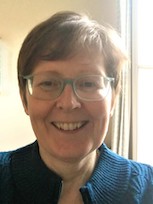
The paper, written jointly with Dr Sue Gifford of the University of Roehampton, won the Janet Duffin Award, presented annually for the most outstanding contribution to the journal Research in Mathematics Education.
The 2018 award was decided by a poll of members of the British Society for Research into Learning Mathematics, who were invited to vote for the article they judged to be the most significant contribution to the journal in 2018.
Julie and Sue’s paper, Teaching mathematics to lower attainers: dilemmas and discourses, is based on detailed interviews with the three teachers of the same pupil, whom they called Bronwyn, as she moved from year four to year six in her London primary school.
Bronwyn had been identified by her teachers as very low attaining in mathematics, but without having any special educational needs. Following on from an earlier study in which they followed 16 primary-age children identified as struggling with maths, the two researchers wanted to explore why teachers found it difficult to include low-attaining children in mainstream mathematics classes.
One of Bronwyn’s teachers, Liz, was typical in feeling she had two ineffective options: to withdraw low-attaining children from lessons to work in small groups on less challenging mathematics, or to include them in whole class lessons which they could not understand.
While the teachers tried to help Bronwyn, they also defined her as lacking capabilities, described her in terms of “neediness”, lack of motivation and requiring repeated help with the same concept. Getting mathematics “wrong” was also seen as a problem rather than an opportunity to investigate and learn.
The researchers used the ideas of Foucault to examine such perceptions, finding that teachers are bound by a standards agenda that holds schools accountable in specific ways, and puts comparison and progress above inclusivity in the classroom.
However, they argue that – while teachers operate in this system – they are also able to question and change it. There is also scope, the paper concludes, for a change in the perception of mathematics from a calculation-based subject defined by right and wrong answers to a greater focus on problem-solving and reasoning – an approach already used in China and Singapore. National UK tests have not yet caught up with government recommendations that primary assessment should “move beyond testing children’s competence in memorising facts and procedures”, says the study.
Julie and Sue conclude: “We have identified possible fault lines that have the potential to subvert dominant views of primary school mathematics. These have begun to be opened up by recent changes in the national curriculum and assessment, supported by the focus on pedagogies in high performing education systems where the nature of mathematics is perceived differently.”
The Janet Duffin Lecture will be given by Julie and Sue at the BSRLM Summer Conference on 8 June 2019 in Birmingham.
“The most exceptional opportunity” – stardom for recent Education graduate

Emma Corrin, a recent graduate of Education with English & Drama at the Faculty of Education, is to star in the Netflix hit TV series ‘The Crown’. Emma has been cast as Princess Diana in Season 4 of the show, with filming due to begin later this year.
In a Netflix announcement, Emma said she was, “Beyond excited and honoured to be joining The Crown for its fourth season.”
Series creator Peter Morgan described Emma as “a brilliant talent who immediately captivated us when she came in for the part of Diana Spencer”.
Dr Georgina Horrell of the Faculty taught Emma during her undergraduate degree. She said, “Emma is a thoroughly lovely person and a wonderful ambassador for the undergraduate course. Like many of our students, whilst at Cambridge she managed an active theatrical life alongside outstanding scholarship. It was an absolute pleasure to teach someone so very talented, engaged and committed to excellence in all spheres.”
The Faculty of Education extends its warmest congratulations to Emma in her successes since graduating in 2018.
Photo credit: Faye Thomas (via IMDB)
"A race against your opposite man" - Faculty rowers on their Boat Race challenge
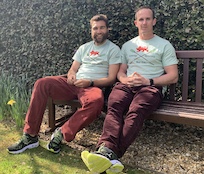
Congratulations to you both on your places in the Blue Boat. Neither of you started your sports careers on the water – how did you get into rowing?
Dara: I started rowing at my high school in Boston in the US. I was 14 but already about 6 foot 3. I was wrestling competitively, and my coach said, ‘You’re tall, wrestlers are good athletes – you should give rowing a try’. My first time in a boat, I just remember thinking, “This is really wobbly, how does anyone do this?’. But I kind of had the knack for it, and continued through school, rowed for the Varsity eight at the University of Pennsylvania and the summer after I graduated rowed in the US U23 team. Then I spent two years at Winchester College here in the UK teaching economics and coaching the rowing team. One of the boys I coached is rowing in the Oxford Blue Boat this year, and another is in Goldie [the Cambridge reserve boat].
Dave: Growing up in Hull, I started out as a track runner. I was almost 6 foot 2 aged 13, and skinny as a rake back then, but the upside was I could run like the wind. I competed in 3000m and 3000m steeplechase, but at about 17 puberty had a second wind and I filled out – I put on about 20kg. But then doing my undergrad degree in economics at the University of Herts, I saw a board in the gym with best times over 2k on the rowing machine and thought I’d give it a crack. I got pulled into the university team and then quite quickly thought I’d find a big club to join. I’d heard of Leander and didn’t realise it was a closed club so I just sent them an email! Luckily for me they were starting a development squad programme and made us a project to win the Thames Cup at Henley, which we did. I took my Master’s at the University of East London, funding my studies and my rowing as a private tutor of maths and economics.
Everyone is fascinated by the intensive training regime ahead of the Boat Race – it seems to get more attention than in most sports. Is it as brutal as it seems?
Dave: I was talking to my mum recently about this and I think too much emphasis is put on the negatives of the training. When people talk about it, the focus is on ‘these guys get up at 5am, it’s early and grim, the sacrifice…’. But to be honest, we’ve got such a good group of guys that I actually find it really fun, and we have a good time.
Dara: It’s definitely difficult and there are definitely times when I’m like, man, I would really rather not do a 5k right now. But the narrative of sacrifice, I hate that. If you’re truly suffering, just stop! We’re getting a lot out of it: we’re hanging out with our best mates, working really hard and it’s fun. We’re training so hard so we can put ourselves in the best position for the race that we want to win. Along the way we get to meet incredible people and go to incredible places. I’ve got more out of rowing than I’ve probably given.
We still need the lowdown on your training schedule and diet!
Dara: Tuesday to Friday we meet at the Goldie boathouse at 6.30am till about 8.20. Then it’s food, and lectures or work. Then back to Goldie for the afternoon bus to Ely and the new boathouse there, and on the water for an hour or two. At weekends it’s two rows in Ely per day, and Mondays are off.
The diet is pretty simple: carbs, protein, veggies, and a lot of it. I’ll generally have a first breakfast of cereal, then post-morning session I’ll have a 2nd breakfast of malt loaf and a protein shake or milk. Lunch will be something simple, sometimes some pasta or a sandwich, to fuel up for the afternoon session. Dinner will be quite large, generally several portions of pasta and veg, maybe throw in some chicken or beef. Rinse and repeat. I don’t eat sweets, though I enjoy ice cream every now and then. Finally, hydration is key: generally I’ll have three litres a day, or try to.
Dave: I'm one of the smaller guys on the team but still need about 6000 calories a day to get me by. In an ideal world I'd make all my own meals, lots of lean meat, rice, and veg, but to be completely honest with you I'm too lazy to cook for myself (I tell myself I don't have
time, which is sometimes true). So I go to the hall or library canteen for second breakfast, lunch, and dinner pretty much every day and just graze on milk, coffee, and malt loaf the rest of the time.
The Boat Race is a head to head event with nowhere to hide. How do you prepare for that psychologically?
Dave: You’ve got to consider the lens through which you present it. If you feel you’re under pressure, that’s just because what you are doing matters to you. When you’re sat at the start line of a race, the pressure can be crippling, but that’s because you really care about whether you win or lose. There are days when you’re absolutely exhausted and just want to turn your alarm off and go back to sleep, but we all know that if you’re feeling like that, your opposition is feeling like that too.
I was in the reserve boat last year, and to get everybody a bit more hyped up in their mindset I would refer to the Boat Race as a drag race: not so much a race to the finish line but more a race against your opposite man. Everybody has a breaking point: we just have to make sure that ours is a little bit further down the road than our opposition’s.
Dara, you rowed in the Blue Boat last year, when Cambridge men’s and women’s crews swept the board. How does this year’s experience compare?
Dara: Every year the squad seems to have its own identity, its own story. What happened last year has absolutely no bearing on what happens now. The psychology comes from the individuals in the team and what guys are feeling, what motivates everyone. We’ve done a pretty good job this year of taking what we have in terms of different strengths and approaches to racing and getting a pretty good idea of what we want our crew ethos to be.
Dave: One thing that has stood out to me is that the culture as a group has been better than any I’ve been in in the past. One of the interesting things about this event is you have everybody from former Olympians like James Cracknell right down to rowers in their first year out of school. Everybody has different roles: the top guys have shared wisdom and experience and the young guys have to be biting at their heels to keep them honest.
You’re both studying Education; what’s your main focus, and how do you balance your academic and sporting commitments?
Dave: I’m in the first year of my PhD, looking at the link between the different ways of teaching maths and how maths students cope with the subject at university. All the evidence shows both teacher-led and student-led teaching styles can be effective. But even though teachers tend to prefer student-led styles, teacher-centred learning is becoming more common because teachers are under more pressure to get results. In most subjects, student grades are a very strong predictor of how likely they are to continue, whereas in maths and science there’s less correlation. A teacher-centred student could get an A in maths but is more likely to think they can’t progress up to university study. I’m trying to build some statistical models to investigate the relationship between the way you’re taught and whether you want to continue maths.
I use the Faculty library among others in Cambridge. I’ve always found the staff helpful and it’s peaceful to work there.
Dara: When I was teaching at Winchester, the head of the economics department really had his finger on the pulse of how the school was being run, and what direction it was taking. I enjoyed teaching but I really loved those questions of system and structure - almost the admin side of it. I’d majored in economics but started to think about education for the first time: about state versus private sector systems, whether schools should have to take on a common core curriculum. My mother grew up in Bermuda: it’s one of the world’s wealthiest nations per capita but no one is happy with the education system. That’s what I want to focus on for my dissertation.
Everyone at the Faculty has been very accommodating. I’ve been pretty up-front about the times I can do, and with planning and foresight things are doable. When I’m in a bit of a crunch I go to the Faculty library and say, ‘Is there anything you can help me with on this topic’? They have so many resources and they’ve been really helpful.
What’s your mindset as race day approaches?
Dave: Among the squad we’re trying to train like underdogs and then race like winners. Anything can happen: we may have to fight them down. You want to go in knowing you are ready for absolutely anything. We have a TV in the gym where we play race footage and the one we play most is 2003, when Cambridge went in as favourites and lost by one foot.
Dara: Oxford will be very good on the day. They will show up and put out a really good performance. We have to keep making this progress. There’s a wrestling joke: unless you continually train to your limits, you’re going to learn a quick and painful lesson from someone who does. I’m always saying, we can’t take our feet off the gas. I think this race will be a real humdinger.
Faculty PhD student named Teacher of the Year
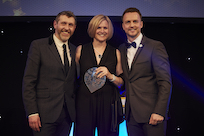
Maths anxiety causing "rage and despair" in children - new study
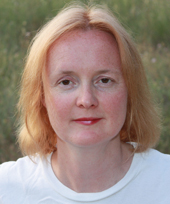
The investigation by researchers from the Faculty of Education and the Centre for Neuroscience in Education at Cambridge revealed that primary and secondary pupils with maths anxiety expressed “overwhelming negative emotions” ranging “from rage to despair” as they struggled with the subject.
The reactions arose despite the fact that most children with high maths anxiety are normal to high achievers in maths, and have not had different experiences in lessons from peers without the condition, according to the study. In both primary and secondary age groups, “the mathematics classroom is a very different world for children that are mathematics anxious compared with those that are not”.
Common Triggers
While each child suffered individual anxiety, researchers uncovered common “triggers”, including poor marks, test pressures, teasing by fellow pupils and a confusing mix of teaching methods.
Today’s Nuffield Foundation report, Understanding Mathematics Anxiety: Investigating the experiences of UK primary and secondary school students, was prompted by a “mathematics crisis” in the UK, say its authors. The proportion of adults in the UK with functional maths skills (equivalent to a GCSE grade C) fell from 26% in 2003 to just 22% in 2011 – well under half the 57% who achieved the equivalent level in literacy skills.
Maths anxiety is a focus of concern because it worsens maths performance. A review of existing research literature carried out for the report concluded that students who have the condition face a vicious circle, with their anxiety leading to poorer performance and poorer performance increasing anxiety. This happens even though a 2018 study showed that it is not only children with low maths ability who experience maths anxiety – more than three-quarters (77%) of children with high maths anxiety are normal to high achievers on curriculum maths tests.
Children’s views
The latest research is ground-breaking in searching out and evaluating children’s own views in detail over time to produce qualitative as well and quantitative data, and in focusing on maths anxiety sufferers at a much younger age than previous studies. A total of 1,700 UK pupils aged from aged eight to 13 were surveyed, including 120 tracked with detailed interviews, together with 1,000 Italian pupils.
The origins and triggers of maths anxiety differ between students, researchers found, but both primary and secondary age groups highlighted a “general sense of feeling the subject is hard compared with other subjects”, leading to a subsequent lack or loss of confidence.
Most children with maths anxiety reported particular trigger incidents or experiences which had led to anxiety or nerves in maths lessons. For most primary age children, the problem arose when work became more challenging or they received poor marks in classwork. The next most common reason for anxiety was specific elements of maths teaching, and particularly confusion caused by being taught by multiple teachers who used different methods to explain concepts. A third common cause of maths worry was the views of others, primarily mockery by classmates but also unfavourable comparison with siblings or parental pressure.
School transfer pressures
At secondary level, although some maths anxious students reported that the condition had always been part of their lives, most again perceived specific events or situations as triggering their anxiety. The transition from primary to secondary school was often cited as a source of maths worry, leading researchers to call for a greater focus on maths teaching during the school transfer process. Pupils’ perceptions were that the work was harder, that they couldn’t cope, that there was more pressure from tests and increased homework. “Underpinning these comments seemed to be a sense that the stakes had been raised because it was now more important to do well at maths,” the study found. “The pressure of SATS [national tests taken in year 6] was also a root of anxiety for some.”
Poor classroom relationships
Secondary pupils also pointed to the approach of particular maths teachers, including a lack of ability to explain concepts clearly but also poor interpersonal skills that affected classroom relationships. Another concern was ability grouping, with pupils’ anxiety triggered by unfavourable comparisons with more able classmates – though dropping down to an “easier” set could often help resolve anxiety. A general sense of lack of progress or diminishing confidence, or increasing worries about others’ opinions, was also common.
Researchers compared the interview responses of children with maths anxiety – identified using a special test – with those of children without the condition and found “a stark contrast in the learning experience between the maths anxious and those that are not”, both in primary and secondary schools.
From rage to despair
“The experiences of maths anxiety are multifaceted, with students expressing emotions from rage to despair,” the report found. “Students often reported overwhelming negative emotions which in some cases led them to act out in class and be removed from the classroom, or to become tearful. Others reported that they dreaded their mathematics lessons or that physical symptoms had an impact on their ability to flourish.”
Emotional manifestations included feelings of apprehension, tension, frustration or fear, while physical symptoms included butterflies, a racing heart or struggling to catch breath.
These very “real and immediate consequences for young people in school” were often overlooked as the negative impact of maths anxiety was usually seen in economic terms, the researchers warned. Irrespective of the long-term consequences, educators have a moral duty to address the suffering experienced by students now, the report argues.
Need for resilience
Despite the connection with “trigger experiences” reported as promoting maths anxiety, the condition appears to be linked to children’s individual reactions to those triggers based on their personality. Researchers concluded: “It is notable that mathematically anxious children have not necessarily had any objectively different experience than those without mathematics anxiety. Rather the difference comes from their subjective interpretation of those experiences and this might stem from other personality features, such as resilience and self-efficacy.”
Children without maths anxiety saw maths challenges as a chance to grow and develop, while those with the condition were more likely to see maths ability as fixed. This means it is important for education practitioners, parents, siblings and peers to model “self-efficacy, resilience and potential for growth and development in mathematics”, the report argues. “Since mathematics anxiety may work in a vicious circle, with anxiety decreasing performance and this increasing anxiety, improving student experiences within their mathematics lessons may help to lessen their mathematics anxiety, which may go on to increase their performance in mathematics in general.”
Address root cause
Dr Ros McLellan of the Faculty of Education, a co-author of the paper and leader of the interview research, said: “Maths anxiety is very much an emotional reaction. Younger kids won’t want to go to school when they have maths classes: they get tearful and upset. We had some young people saying, ‘I get so frustrated, I end up hitting the desk’, and then they get themselves into bother. If we know what is at the bottom of the problem rather than addressing the symptoms we can address the root cause.”
The researchers had been surprised to find that maths anxiety is not stable, and can be gained or lost, Dr McLellan said. “Just because you have it doesn’t mean you’ll have it for ever more.” Moving to a lower maths set could help pupils anxious about pressure or ridicule from peers, and teachers could help by creating a more positive learning environment “focused on promoting learning as growth and not just right and wrong”.
Relationships within the classroom were also critical, she added. “A lot of work has been done on relationships in school but not in relation to maths anxiety, so there is scope for more focus there.”
- The report can be found here.
- For more information, contact Lucy Ward, Communications Manager, Faculty of Education: lw528@cam.ac.uk.
Drive to open up rare children’s books to all online

Works for children ranging from fables and fairy tales to illustrated alphabet primers and early moveable books with tabs and even sounds often lie shut away in special collections, accessible only to scholars able to view them in situ. Children's books are one of the UK's great success stories, yet Britain lags far behind other nations when it comes to archiving and granting digital access to this legacy.
Now a new network, headed by Dr Zoe Jaques of the Centre for Research in Children’s Literature at Cambridge (CRCLC) in collaboration with Professor Eugene Giddens at Anglia Ruskin University, will investigate possibilities for digitising these rare and fascinating materials, opening them to a wider readership including children, parents and teachers.
US-UK collaboration
The network, funded by the Arts and Humanities Research Council, unites experts from one of the largest collections in the world, the Baldwin Library of Historical Children's Literature at the University of Florida, and from the University of Cambridge. The Baldwin Library boasts over 87,000 books, including more than 6,000 digitised titles. At Cambridge, Homerton College Library’s growing children literature collection comprises over 10,000 books and almost 1,000 rare volumes, but none are yet digitised.
Throughout 2019, scholars and archivists from both universities will come together to examine current practice and future trends in digital archival scholarship. They will explore how the latest developments in digital humanities and “distant reading” – using computers to access and analyse large bodies of text – could influence policies on how books are digitised.
Sharing via social media
Since illustrations and interactive elements such as sounds and tabs are often important parts of the reading experience for young children, the researchers will examine ways they can be captured digitally, not only through library platforms but through social media.
The project has launched Twitter and Instagram accounts, with the hashtag #digiChildLit used to provoke wider discussion on the free availability of historical children's texts. Both accounts are also hosting a “virtual exhibition” of 200 illustrated covers from the Baldwin Library and Homerton College Library. YouTube will be used as a platform for 30 videos that focus on movable books, taking inspiration from short videos produced by Homerton College Library of some of its rare Victorian collection.
Dr Jaques said: “By uncovering the wonderful history of children’s books and illustrations, parents and teachers can unlock cultural history and foster creativity in new ways: for instance, those wanting to explore the natural world can delve into the lovely field guides so popular with the Victorians; those feeling lifted by a glorious spring day can see how Kate Greenaway imagined children playing in March.”
Support for teachers
Teachers will also be encouraged to get involved with a workshop showing how to use digital archives to bring a set text such as Dickens’ A Christmas Carol to life, showing historical changes to wording and illustrations while teaching children digital research skills.
- Find more information here about the one-year Master's course in Critical Approaches to Children's Literature at the Faculty of Education.
Faculty students join global education experts at Yidan Conference
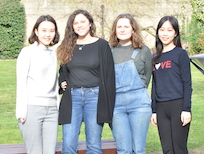
At the Yidan Prize Conference: Europe, being held in Cambridge on Monday 4 March 2019, the PhD students will focus on the theme 'How can NGOs contribute to innovation in Education?'.
Based on their own experiences of running, working for and researching a range of NGOs, the speakers will discuss issues including how NGO-implemented innovations can support and function within existing education systems, how to mobilise students to address educational problems, and what influences student volunteers may bring to disadvantaged children.
The Yidan Prize conference, taking place at Jesus College, Cambridge and hosted jointly by the College and the Faculty of Education, features prominent speakers including the two latest recipients of the prize, Professor Larry Hedges of Northwestern University and Professor Anant Agarwal, CEO and founder of the online learning platform EdX.
Professor Anna Vignoles and Professor Paul Ramchandani, both of the Faculty of Education, will also address the conference, together with Professor Stephen Toope, Vice-Chancellor of the University of Cambridge and Dr David Halpern, Chief Executive of the Behavioural Insights Team and National What Works Advisor.
The event will be livestreamed via YouTube.
Founded in 2016 by Dr Charles Chen Yidan, core founder of the Chinese internet service portal Tencent, the Yidan Prize aims to create a better world through education. The prize, which bestows HK$60 million (around US$7.8 million) worth of awards annually, is divided into two categories: The Yidan Prize for Education Research, recognising outstanding research that contributes in significant ways to education, and the Yidan Prize for Education Development, recognising innovative ideas that tackle important challenges in the field of education. Dr Chen will address the conference.
The student presentation was organised by Maoxiao Xia and Lini Xiao, both second year PhD students from the Faculty, with support from Professor Vignoles. Also taking part are fellow Faculty student Lisa Walker,
Eleanor Chapman, a recent graduate of Homerton College, Cambridge, and Xiang Wang, a PhD student at the Freie Universität, Berlin.
Lisa will explore how players in the education sector can address the challenge of moving new and effective ideas from pilot to scale, highlighting how the Campaign for Female Education (Camfed) is using innovative approaches to education service delivery. Xiang will draw on her own experience as co-founder of the charity Clover Youth to question what young people can do to enrich educational resources for disadvantaged young people in their own community, while Eleanor will highlight the Schools Plus programme – a scheme training university students to volunteer as teachers and mentors to support less advantaged pupils in local schools.
Pictured (L-R): Maoxiao Xia, Lisa Walker, Eleanor Chapman, Lini Xiao.
New PEDAL Hub offers one-stop information on play

The new PEDAL Hub offers teachers, parents, policy-makers and more the latest research and free resources on play, together with tips on how they can use the findings to support their own children or to inform their work or study.
The website is run by PEDAL, the Centre for Research on Play in Education, Development and Learning at the Faculty of Education, University of Cambridge, headed by Professor Paul Ramchandani.
'Time and space' approach
Indications from play research to date suggest parents and carers should aim for a ‘time and space’ approach when playing with young children, Professor Ramchandani said. “We all have busy lives but setting aside time simply to be playful with your child, undistracted by a phone or any other diversion, is incredibly valuable.
“It’s important to slow your reactions down and follow your child. Provide space for them to set the pace, notice what they are doing and sometimes let them take the lead. This is ‘child’s pace play’: be ready to get involved, but also to step back, not interfere and perhaps just watch if they’re happy and absorbed.”
Global research gap
The PEDAL Centre was founded to address a global gap in researching the role of play in children's education, development and learning. Led from January 2018 by Professor Ramchandani, Cambridge’s first Professor of Play, PEDAL’s goal is to ensure play will be more widely understood by those involved in children’s care and education, with ground-breaking academic research used to inform evidence-based policy and practice.
The new online PEDAL Hub is the first step in ensuring everyone interested in play can discover the latest high-quality research, from Cambridge and around the world. The site includes specially-produced ‘Play Pieces’ aimed at providing information on concepts such as pretend play and self-regulation, together with ways to translate the research into action.
New LEGO funding
Its launch comes as the LEGO Foundation, whose £4 million donation in 2015 established the Centre, unveils plans to continue its funding with a further £2.6 million over five years to May 2023.
Professor Ramchandani said: “We are only just lifting the lid on play’s role in education, development and learning and there is still much to discover. This is why a further five years of funding from LEGO Foundation is so welcome – it will continue to nurture this growing field of enquiry.”
“We know there is enormous interest in the value of play, from parents, educators and policy-makers alike. Some information can be inaccurate or unreliable: our aim is to give access to independent, peer-reviewed evidence in an accessible way.”
Bo Stjerne Thomsen, Head of Research at the LEGO Foundation said: “Parents and caregivers play an absolutely vital role in nurturing children’s play, well-being and learning. We know that play is critically linked to how children grow and develop, to become thriving adults and citizens, and the PEDAL Hub will be a much-needed, credible source, with the latest insights on the importance of play.”
PEDAL Hub will host the PEDAL Centre’s own research as it is published. Findings so far include a study of the way children in the playground use items such as planks of wood and tyres not specifically designed for play, an exploration of pupils’ social networks using GPS tracking technology, and research on the role of play in early years education in Ghana.
In time, the Hub will also be a platform that will create a dialogue with researchers, teachers and others about play.
Notes:
For more information, please contact:
Lucy Ward, Communications Manager, Faculty of Education, University of Cambridge: lw528@cam.ac.uk
Christina Witcomb, Senior Communication Manager, LEGO Foundation: christina.witcomb@LEGO.com
PEDAL Hub: https://www.pedalhub.net/
Faculty of Education, University of Cambridge: https://www.educ.cam.ac.uk/
PEDAL Centre: https://www.educ.cam.ac.uk/centres/pedal/
LEGO Foundation: https://www.legofoundation.com
PEDAL Centre
The guiding focus of the centre’s work is to develop substantial and compelling research concerned with the role of play and playfulness in young children’s learning and development, and the potential of play-based approaches within educational contexts. The kinds of skills and accomplishments that are widely recognised as being vital components of 21st century educational provision, including critical thinking, problem-solving, interpersonal abilities, emotional resilience and creativity, have all been linked theoretically and empirically to playfulness and playful learning.
PEDAL's programme of research includes:
• innovative use of GPS technology to track and observe social interactions in playgrounds;
• working with teachers to develop and evaluate playful approaches to early science education;
• investigating how 'playfulness' can be measured in the first 1,000 days of a child's life.
LEGO Foundation
The LEGO Foundation aims to inspire and develop the builders of tomorrow; a mission that it shares with the LEGO Group. The LEGO Foundation is dedicated to building a future where learning through play empowers children to become creative, engaged, lifelong learners. Its work is about re-defining play and re-imagining learning. In collaboration with thought leaders, influencers, educators and parents the LEGO Foundation aims to equip, inspire and activate champions for play.
Join our Agents of Change NQT Conference - 22 March 2019
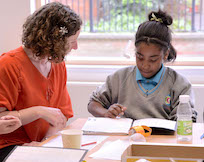
The day offers a chance to hear from top-level speakers, attend a wide range of workshops to contribute to ongoing development in your schools and network with fellow teachers.
Our keynote speakers include Dr Rob Loe, Director of the Relational Schools Foundation, who will share research evidence that students who feel connected to school and cared for by people at school are happier, healthier and succeed in the classroom.
Dr Tom Harrison, director of education at the Jubilee Centre for Character and Virtues at the University of Birmingham, will speak on character education, asking what the concept means and how it might contribute to the lives of individuals, schools and society. Character is an important concept within the new Ofsted framework, so Tom’s talk offers a chance to hear the latest ideas on how it can be taught and curricula shaped accordingly.
Alongside the two keynote addresses, attendees will have the chance to attend relevant and practitioner-focused workshops on topics such as classroom dialogue, coding, poetry, philosophy and making the most of museums and galleries, as well as a session on unlocking your own leadership potential. There will also be plenty of time to mingle and network with colleagues and workshop leaders.
The event is open to all new primary and secondary teachers, whether you trained at the Faculty of Education or not. The fee, subsidised by the Faculty, is just £35 per teacher for the day.
To book, or for more information, please email nqtconference@educ.cam.ac.uk.
New Gatsby PhD student to focus on labour market role of technical skills
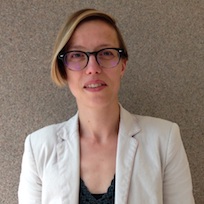
Speaking about her plans for her PhD, Malgorzata said: “I'm looking forward to working with Gatsby and my supervisor to shed light on this sector of the labour market and develop our understanding of employer demand for technical skills.”
Stronger political leadership needed to close global gender divide in education
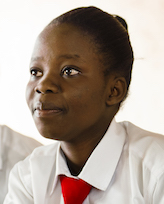
The study, commissioned by the UK Foreign and Commonwealth Office (FCO) and produced by the REAL Centre at the Faculty of Education, University of Cambridge, reveals that the most disadvantaged girls rarely reach high levels of education, beyond primary, that benefit most from national and aid funding. In Nigeria and Pakistan, girls from poor rural households average just one year at school, while rich urban boys enjoy 11 or 12 years of study.
National governments and donor countries must show greater political commitment if global goals on gender equality in education are to be reached, according to the report, 12 Years of Quality Education for All Girls: A Commonwealth Perspective.
Barriers to access
The study highlights an array of barriers that prevent girls accessing education, including gender-based violence within and on the way to school, and absenteeism during menstruation because of a lack of availability of sanitary protection. For marginalised girls, cost is also a key barrier in sending girls to school, with poverty leading some girls to have sex with men who provide them with the essentials of secondary schooling that their family cannot afford. Schools must be made “safe spaces” for girls, particularly in areas affected by conflict, say the authors, while cash support for the poorest families may help ease financial pressures and free up daughters to go to school.
Professor Pauline Rose, Director of the REAL Centre and author of the report, said: “Evidence shows us what works to address barriers that marginalised girls face in their access and learning. Much more needs to be done to implement these interventions at far greater scale. It is vital that current political uncertainties do not jeopardise the prioritisation of investment in girls’ education to enable this to happen.”
The report was commissioned by the Platform for Girls’ Education, co-chaired by the UK Foreign Secretary and Kenyan Cabinet Secretary for Education. The platform, a group of 12 influential figures across the Commonwealth, was created after the Commonwealth Heads of Government Meeting (CHOGM) in April 2018 affirmed the importance of 12 years of quality education for all, particularly marginalised girls. Achieving that target by 2030 is one of the UN Sustainable Development Goals signed up to in 2015 by leaders across the globe.
Equality a “distant reality”
The study finds that, over the past 20 years, considerable progress has been made in increasing access to primary schooling in the 53 countries of the Commonwealth. There are now equal proportions of boys and girls primary enrolled in 31 out of 44 Commonwealth countries with data. But despite this progress, “12 years of schooling remains a distant reality for many of the most disadvantaged girls residing in Commonwealth countries,” the report says. Gender parity in enrolment has sometimes been achieved even though primary schooling is still not universal: in 2017, 137 million primary-and-secondary school aged children were out of school in these countries, approximately half of them girls.
In 15 out of 21 Commonwealth countries with available data, poor rural girls spend no more than five years in school, and so have little chance of making the transition to secondary school. In six countries, they spend only one or two years in education. Children and adolescents affected by conflict are most likely to be out of school, and refugee girls are particularly at risk: they are half as likely as their male counterparts to be in secondary school.
Poor learning in school
Even those children in school are frequently not learning the basics, researchers found. The recently launched Human Capital Index shows that girls’ education fares far worse when years in school is adjusted for whether or not children are learning. In 14 out of the 26 countries with data, girls who are in school are learning only for the equivalent of six years or less. The picture is likely to be even starker for girls in rural areas and those facing other forms of disadvantage.
Disadvantage starts early, the study says, with many girls denied early years investment that is proven to boost educational achievement later. In eight of 14 Commonwealth countries with data, no more than 40 percent of poor rural girls have access to pre-primary education, and in three out of these eight countries, fewer than 10 percent are enrolled.
Governments should do more to target funding on lower levels of education and marginalised groups, the report argues. In 33 out of 45 Commonwealth countries with data, governments are spending far more on post-primary levels of education than on primary schooling, even though the probability of the most disadvantaged girls reaching these levels of education is extremely low. Of the 35 Commonwealth countries with data on pre-primary spending, 25 governments are spending less than five percent of their education budgets on pre-primary education.
Early years not prioritised
The same failure to prioritise the early years is seen in education aid spending. Funding for primary education fell from around two thirds in 2002 to under a half (47%) by 2016, and a mere 0.4 percent of education aid to Commonwealth countries was spent on pre-primary education. By contrast, 10 percent is spent on scholarships to allow students from aid-recipient Commonwealth countries to study in donor countries, even though only the most privileged benefit from such schemes.
In addition, only around five percent of total education aid appears to be spent with the main objective of achieving gender equality. The UK alone bucks the trend, with all but 2% of education aid targeting gender equality directly or significantly affecting it.
To tackle discrimination and work towards gender equality in education, governments of Commonwealth countries must show visible high-level political commitment backed by resources, the study concludes. Funding towards early childhood education and early learning should be prioritised.
Support for girls at puberty
There must also be steps to address the particular challenges marginalised girls face at puberty, such as provision of sanitary pads in schools, and moves to keep girls safe and secure in school, including providing female staff, secure buildings and door-to-door transport between school and home. More broadly, gender-sensitive teaching practices and materials are needed to ensure discriminatory stereotypes are not enforced, says the study.
The report sets out three priorities for further action, including “high-level, visible political leadership” towards gender equality in education, backed up by sufficient resources to reach the most marginalised girls. Investment in early years education is also vital, together with making girls’ education a priority in wider national development planning.
• For more information, contact: Professor Pauline Rose or Faculty of Education Communications Manager Lucy Ward on lw528@cam.ac.uk, tel +44 (0)7788567707
• The report will be launched at the Education World Forum, the world’s largest gathering of education and skills ministers, in London on Monday 21 January 2019.
• The report was commissioned by the Platform for Girls’ Education, co-chaired by the UK Foreign Secretary Jeremy Hunt and Kenyan Cabinet Secretary for Education Amina Mohamed. The Platform, a group of 12 influential figures across the Commonwealth, was launched by the UK government after the Commonwealth Heads of Government Meeting (CHOGM) in April 2018 affirmed the importance of 12 years of quality education for all, particularly marginalised girls. In response to the CHOGM commitment to “leave no girl behind”, the platform aims to drive forward action in the run-up to the organisation’s next meeting in 2020.
• Quality education for all is one of 17 Global Goals that make up the United Nations’ 2030 Agenda for Sustainable Development. In 2015, leaders across the globe committed to ensuring that, 2030, all girls and boys complete free, equitable and quality primary and secondary education.
• Image credit: Eliza Powell/Camfed
Learn about our Education degree with new student Insta diary

You can find more information about the Education course here on our website, and do take a look at Ruth’s introduction to her new Insta diary, below. We hope you’ll follow @MyCambridgeEducation – please feel free to leave feedback and, most importantly, ask any questions you may have about the course or undergraduate life at Cambridge.
Introducing @MyCambridgeEducation, by Ruth Parker
I hope you enjoy my posts - please let me know if you have questions or particular aspects you’d like me to feature.
Ruth
School starters want more help in managing friendship, new research finds
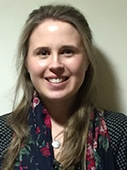
A study led by Dr Christine O’Farrelly of the Faculty of Education, University of Cambridge, asked pupils seven months into their Reception year what they thought a new school starter would need to know.
The children, aged four and five, highlighted the need for strong social skills to take the plunge and make new friends and navigate friendships, but also to avoid distress and victimisation. Other priorities suggested by the children included having the confidence to ask to go to the toilet, to be able to play creatively and especially outside in a space where they felt safe, and to have strong links between school and home.
The research, published in the journal Early Childhood Research Quarterly, is based on the views of 42 children in a school in a deprived area of north Dublin. In the Children’s Thoughts About School Study, academics used pictures showing typical scenarios to focus discussion, and asked pupils to give a cartoon character called Riley Rabbit advice on preparing for starting school as well as discussing their own experiences.
While very young children have been asked about their school experiences before, the study is believed to be the first explicitly to involve pupils in improving the interventions that will target their younger peers.
School readiness programmes are widely seen as vital in efforts to close the developmental gap already present at school entry age between children from poorer backgrounds and their better-off classmates.
Many of the 25 top priorities listed by the children in the Dublin study match those already regarded as important in preparing for school, including skills in reading, writing and counting. Children also listed other routinely-assessed skills such as being able to regulate emotions and behaviour, paying attention to teachers and following rules.
However, researchers found that the four- and five-year-olds identified other key skills for starting school that are not typically measured or targeted in school readiness programmes. O’Farrelly said: “While there is a lot of overlap with what adults think is important, what is really striking here is children have been able to point us to other areas that are important for adjustment.
“Adults tend to zone in more on numeracy and literacy, while children think about all the skills that help them navigate their school environment. They focus a lot on being able to make friends and maintain those friendships, and maybe deal with loneliness, rejection and conflict. These were central to what mattered to them.”
One child in the study said a new school starter would “need to know how to say hi in the yard [playground], maybe she will make some friends out in the yard”, while another warned “her friends might not let her play”. The children highlighted the risk of loneliness and rejection, with one noting, “he has no one to play with, no one to speak to”.
Adults were beginning to acknowledge the need to recognise not only children’s cognitive skills but their social and emotion capabilities, O’Farrelly added. “Children really bring that to life: they talked about what it might be like to approach another child and ask to play, what would happen if they said no, and how to manage aggression or a conflict situation.
“We need to support them in developing those skills, not just in the classroom but in the playground.”
Children interviewed in the study, whose school uses a play-based curriculum, were “hugely enthusiastic” about play, including creative and imaginative play opportunities, O’Farrelly said. They relished playing outdoors, though were again aware that time in the playground – with less supervision than in a classroom – could feel “riskier”.
The Reception pupils also saw “agency” – in learning and also wider independence – as important. While being able to manage going to the toilet alone is widely seen as part of school readiness, children raised the issue of ensuring new pupils had the confidence to ask for permission.
The school in the study, titled Reconstructing readiness: Young children’s priorities for their early school adjustment, is part of a Dublin-based randomised control trial of a project called Preparing for Life. The scheme, which works with families from pregnancy to the start of school, was launched amid evidence that children from deprived backgrounds lag behind their peers by the time they started school, and that the gap widens over time.
O’Farrelly said: “We wanted to hear children’s own voices and perspectives in the context of these considerable interventions to improve their life chances. Their views will inform the interventions that target their peers as they prepare for school.”
Other academics involved in the study were Ailbhe Booth of University College Dublin, Mimi Tatlow-Golden of The Open University and Beth Barker of Imperial College London. The research was linked to the Preparing for Life evaluation and funded by the Children’s Research Network.
Notes:
• For more information, contact Lucy Ward, Communications Manager, Faculty of Education, University of Cambridge: lw528@cam.ac.uk
• Reconstructing readiness: Young children’s priorities for their early school adjustment, is published in the journal Early Childhood Research Quarterly
• Short video summarising the research here
Post-natal depression in dads linked to depression in their teenage daughters
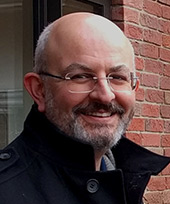
Almost one in 20 new fathers suffered depression in the weeks after their child was born, according to a study published in the journal JAMA Psychiatry and co-authored by Professor Paul Ramchandani of the Faculty of Education, University of Cambridge.
The research, based on a sample of more than 3,000 families in Bristol, UK, also identified a link between post-natal depression in men and depression in their daughters as they reached adulthood.
At 18, girls whose fathers had experienced depression after their birth were themselves at greater risk of the condition, researchers found. The “small but significant” increased risk applied only to daughters; sons were not affected.
One reason for this “handing on” effect could be that post-natal depression in fathers is sometimes linked with an increased level of maternal depression, researchers concluded. This might mean that family life is more disrupted for everyone with higher levels of stress for all. It may also be that the having one or both parents with depression affects the way in which parents interact with their children.
It is unclear why girls may be more affected at this age. There may be links to specific aspects of father-daughter relationships as girls go through adolescence, the research team suggests.
The findings are important because they have implications for perinatal services, which have traditionally considered post-natal depression to be a potential problem for mothers only, the study’s authors say. They highlight the importance of recognising and treating depression in fathers during the postnatal period, and call on health professionals to consider both parents when one reports depression.
Professor Ramchandani said: “Research from this study of families in Bristol has already shown that fathers can experience depression in the postnatal period as well as mothers. What is new in this paper is that we were able to follow up the young people from birth through to the age of 18, when they were interviewed about their own experience of depression. Those young people whose fathers had been depressed back when they were born had an increased risk of depression at age 18 years.
“We were also able to look at some of the ways in which depression in fathers might have affected children. It appears that depression in fathers is linked with an increased level of stress in the whole family, and that this might be one way in which offspring may be affected.
Earlier research by the same academic team found post-natal depression in fathers was linked to behavioural and emotional problems in their children at three and a half and seven. The effect seems to happen because paternal depression may negatively affect the way a family functions – causing conflict between partners and prompting maternal depression.
The new paper, Association of Maternal and Paternal Depression in the Postnatal Period with Offspring Depression at Age 18 Years, was based on the experiences of 3,176 father and child pairs drawn from the Avon Longitudinal Study of Parents and Children – an ongoing cohort study launched in 1991.
Co-authors of the paper with Professor Ramchandani are Leticia Gutierrez-Galve of University College London; Alan Stein and Lucy Hanington from the University of Oxford; Jon Heron of University of Bristol; Glyn Lewis of UCL; and Christine O’Farrelly of the Faculty of Education, University of Cambridge.
• For more information, please contact Lucy Ward, Communications Manager, Faculty of Education, University of Cambridge, on 07788 567707; email lw528@cam.ac.uk
• Link to the paper: Association of Maternal and Paternal Depression in the Postnatal Period with Offspring Depression at Age 18 Years
Faculty well represented as 1000 attend WALS Beijing conference
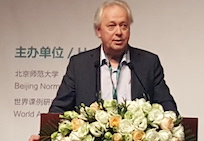
The conference was organised with Beijing Normal University hosts by Faculty member Pete Dudley who is currently President of WALS. While in China Pete also spoke at Fujian Normal University (at the annual conference of the 3000 schools-strong ‘School As Learning Community’ network) and again in Nanjing, this time alongside Faculty PhD student Ying Ji, at the annual conference of China’s Senior Education and Teaching Research Academy – SETRA. Pete and Ying delivered their talk to 2500 teachers and school leaders).
Pete’s recent article from the Camden project on ‘Close to Practice’ system-learning through lesson study was published in BERA’s ‘Research Intelligence’ magazine also in November.
EdFac Library team praised for “brilliant” work
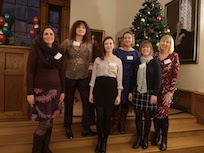
The Faculty Library team, led by Angela Cutts, was recognised in the Professional Services Recognition Scheme, which highlights and celebrates the very best administrative work across the University. The scheme is open to all administrative staff across the University whose work supports research, teaching and scholarship; and nominations may be submitted by anyone working in the University.
The team, described as “brilliant” by University Librarian Dr Jessica Gardner, was shortlisted for the category “We deliver an effective and high-quality service”.
The team was nominated for the award by Dr Frances Foster, Senior Teaching Associate and Classics specialist at the Faculty. She wrote: “The Faculty Library team are simply fantastic… They are responsive to everyone's needs, and everything is not only kept up-to-date and accessible, but they figure out ways in which students and staff can get hold of materials, even when they're complicated or obscure.
“They are always approachable and knowledgeable about all aspects of information retrieval, and use their expertise to provide a truly stunning service. The Faculty Library also runs very active social media and outreach so that they help to promote the work done by members of the Faculty. I love libraries, and use lots which are all brilliant, but this is the best library service I've encountered.”
The library team provided targeted help to staff and students alike, she added. “Students receive bespoke library training, in cohorts (i.e. the course and level they're studying on) as well as individual training with library staff. Students can ask for help with referencing and locating material at any time while working on assignments, which means they're less likely to avoid things that are difficult for them to reference but otherwise would improve their quality of thinking.
“Equally, for staff, the Faculty library team are fantastic in locating information which I need - and this includes articles in obscure journals which have been poorly referenced by others. And they help promote my publications, thus giving me the time to start working on my next one!”
The new accolade for the Faculty Library comes just weeks after it was praised by Ofsted for providing teaching trainees with “precise guidance and support”. Ofsted rated the Faculty’s PGCE teacher education as “Outstanding”.
Technology in higher education shouldn’t mean more YouTube lectures, Faculty head warns
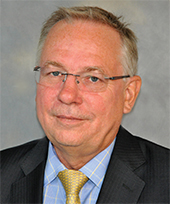
Addressing the first University of Innsbruck Day of Teaching, Professor Hayward warned educators against simply “using technology because it is there” and called for clarity first on what they aimed to achieve before considering how to harness information technologies to achieve those goals.
Simply using YouTube and TED talks to make the traditional lecture available to mass audiences was inadequate to fulfil the real purpose and potential of higher education, he said.
Dialogue not monologue
To achieve those wider aims, including deepening learning and “cultivating humanity”, learners needed to engage in dialogue with each other and their teachers and to develop understanding together, he told delegates. Information computer technologies (ICT) were too often “monologic”, giving one-way access to information for learners, rather than providing the conditions for interactive learning.
Research had shown the benefits of a “dialogic approach to pedagogy”, providing spaces that were “rich with with exploratory talk, a lively exchange of questions and responses that serve to broaden, deepen and correct the system of commitments that constitute understanding,” Professor Hayward said. The challenge for ICT in education was to support the development of spaces in which learners could develop understanding together.
Technology could enhance the quality of the student experience, he stressed, but would not “on its own lead to a revolution in the way we educate”. Too often, technologies simply replicated the narrative form of the lecture but did not facilitate the “deep interaction” that led in turn to deep understanding.
Support for ICT in Higher Education was often founded on making HE affordable by increasing teachers’ productivity by teaching more students at once, but this had led to the use of video platforms such as YouTube rather than opening opportunities for new ways of learning.
Developing students’ humanity
It was important to consider the purposes higher education should serve before asking how to achieve them, he told the conference. As well as helping learners understand a particular specialism in depth, universities had a responsibility to prepare them for their future as employees and citizens. Higher education should also develop their students’ humanity, so that they knew how – in the words of the German philosopher Hannah Arendt – “to think and act correctly when the chips were down”.
“I do think monologic, computer-mediated information-accessing and listening to authoritative discourse has a role to play in achieving these outcomes, but it is not sufficient on its own,” Professor Hayward said. “We need to use the technology to build dialogic spaces but I fear we do not yet know enough about how to do that.”
Research with student teachers had shown that learning partly using social networking tools worked successfully only when they were explicitly taught about dialogic learning, suggesting teacher development was key, he suggested.
Teachers “afraid” of teaching through dialogue
In a second keynote lecture last week, at the First International Forum on Teacher Learning and Professional Development at the Beijing Institute of Education, Professor Hayward questioned why teachers were reluctant to adopt dialogic teaching methods in the classroom, even though research had demonstrated their effectiveness in producing outcomes sought by policy-makers such as critical thinking, creativity and resilience.
The problem was partly that teachers found it difficult to use “exploratory talk” rather than traditional “authoritative talk”, but also that they wrongly felt they should use the dialogic approach all the time, and were worried parents or head teachers would not allow them to use the method.
These were all “genuine fears that need to be addressed if we are to help students to learn more effectively”, Professor Hayward acknowledged.
A model called Leadership for Learning, developed by Professor John Macbeath and Dr Sue Swaffield at the Faculty of Education, aimed to address these concerns by focusing on learning as a constant activity throughout schools, including among senior staff.
• For more information, contact Lucy Ward, Communications Manager, on lw528@cam.ac.uk
Homepage carousel image | Claremont High School, Television in the classroom Source: Tasmanian Archive.
Professor Marilyn Strathern opens new faculty programme of public Masterclasses
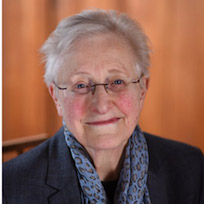
Topics to be addressed, all at the forefront of education debate, will range from rankings and assessment to identities and equality. All Masterclasses will be recorded and videos made publicly available online to ensure conversations at Cambridge are accessible to communities beyond the University.
The first Masterclass, taking place this Thursday (15 November 2018), will feature Professor Dame Marilyn Strathern, a Fellow of the British Academy, Emeritus Professor of Social Anthropology at the University of Cambridge and former Mistress of Girton College, Cambridge.
Most original mind
Professor Strathern has been described as ‘contemporary anthropology’s sharpest and most original mind’. She is internationally known for her contributions to social and cultural anthropology, and especially for her critique of Western understandings of gender and equality, and her explorations of how familiar concepts work differently in different contexts. Her extensive field research began almost 50 years ago in Papua New Guinea on issues of gender and exchange, while in the UK, she has focused her studies on kinship, reproductive technologies, biomedical ethics, and on cross-cultural concepts of intellectual property.
Her ideas challenge some of our most fundamental concepts: of individual and society, of the person, and of the social relation, the method of comparison, and the notions of nature and culture, male and female.
Challenging the audit culture
Professor Stratham has also turned her anthropologically-informed gaze towards policy and institutions, including the management of and human relations within universities. She has written extensively on assessment, and the “audit culture” of higher education and research.
The latter theme will inform Thursday’s Masterclass, titled Regimes of assessment: in the borderlands of the academy.
Susan Robertson, Professor of Sociology of Education at the Faculty and convenor of the talks series, said: "The Faculty of Education Masterclasses are our effort to bring world-leading academics into conversation with the next generation of researchers. Provocative, at times funny, and on all occasions intellectually challenging, we intend this series to be a space that captures the insights of the very best minds."
Thursday's event, organised by the Culture, Politics and Global Justice research group at the University of Cambridge, will take place in the Boulind Room, Mary Allan Building, Homerton College, Hills Road, Cambridge (adjacent to the Faculty of Education). To attend, please register.
Two further Masterclasses in the series are taking place during 2018: the writer, philosopher and cultural theorist Professor Gary Hall will speak on 30 November and on 4 December the event stars Associate Professor Inger Mewburn, Director of Research Training at the Australian National University and editor of the cult PhD blog The Thesis Whisperer.
Videos of all lectures will be made available for free via the Faculty’s communication platforms.
• For more information, please contact Lucy Ward, Communications Manager at the Faculty of Education, on lw528@cam.ac.uk.
Wrigley Company Foundation supports Indian education scheme evaluated by REAL Cent
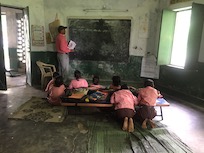
“As we enter the next stage of our partnership with the Wrigley Company Foundation, we continue to be committed to improving the quality of education in India,” said Devyani Pershad, head of program management at Pratham. “The research project has enormous potential to help guide and shape our future strategy for working with children and communities, and we look forward to working with our partners in ensuring its success.”
Pupils’ Armistice tribute to forgotten WW1 poets

School pupils are bringing back the voices of unsung First World War poets by reading their work aloud on the battlefields of the Somme, Passchendaele and Ypres.
In a project led by Julie Blake, a PhD student at Cambridge University’s Faculty of Education, almost 60 secondary school students are visiting the battle sites and cemeteries to mark the centenary of the Armistice that ended four years of devastating conflict in World War I.
The initiative is run by Poetry by Heart, a project set up in 2012 by the former Poet Laureate Andrew Motion and Blake, a former teacher and the project’s director, with the aim of encouraging children to memorise, recite and enjoy a wide range of poetry.
Lesser-known poets
The verse spoken by the pupils at the battle sites focuses on lesser-known poets of the Great War, often obscured over the last century as anthologies pushed other names to the fore. They will recite verse by non-British poets (including Indian, Polish and American combatants), the poems of German soldiers, works by women and other non-combatants, poetry in other languages and verse written by later poets looking back on WW1. The work of Professor Constance Ruzich, whose Behind Their Lines blog has paid tribute to the work of lesser-known poets throughout the centenary commemoration, has informed the project.
The students and teachers visiting the sites during the two trips – one completed last month and the other taking place from 16-19 November - come from a range of English secondary schools. All have been involved in the past with the annual Poetry by Heart poetry recitation competition for school pupils, and most are entrants to this year’s competition in which students were invited to recite war poetry. Poignantly, the visiting pupils are not much younger than many of the soldiers killed in WWI, and are paying respects at the graves of young soldiers during their tour.
Emotional literacy
One teacher on the October tour said: “I can hardly imagine something more poignant than a British teenager willingly speaking 100-year-old words aloud in a battlefield or cemetery: British, French, German. The juxtaposition of modern youth and their historical counterparts’ gravestones is both beautiful and tragic. What better for their empathy and emotional literacy for a young person - or in fact any person - to select, read, study, interpret, learn, embody and then share a poem that has touched them?”
Another, Jess Lancaster, said: “Hearing our students recite their poetry in the cemeteries commemorating the lives of so many dead soldiers, often those who wrote the words the students spoke, was such an intensely moving moment. It gave so much depth of meaning to the poems, more than they have ever had before teaching them in a warm, modern classroom. There was something about standing on the battle grounds, hearing about the condition, with it s privation and terror, before hearing the words, that rendered to those often very familiar lines such power to move me to tears on more than one occasion. Perhaps it was the youth of the reciting students - who were often close in age to the poets - which brought home the stark reality of the war.”
For Poetry by Heart director Blake, the highlight of the tour came at the Thiepval Memorial, which commemorates 72,000 British and South African soldiers who died at the Somme. “Students in turn stepped forward, announced the title and poet of their poem, and recited it by heart, beautifully. The students, teachers, and tour organisers just listened, taking in the words and the setting and the youth of the students reciting these poems, often written by people not very much older than them. Other visitors to the memorial stopped and listened and commented afterwards on how moving it was.”
Horror of the trenches
While some more familiar work, such as the poetry of Wilfred Owen, is also included, the reawakened voices of less celebrated poets have illuminated afresh the horror of the trenches. The Welsh-language poet Hedd Wyn (killed on the first day of the Battle of Passchendaele in July 1917), wrote in a poem titled Rhyfel (War):
The old harps that were played before are
Suspended on the branches of yonder willows,
And the scream of the boys filling the wind,
And their blood mixed with the rain.
(transl. Wade Dowdell)
From the other side of No Man’s Land, the Austrian poet Georg Trakl described in his poem On the Eastern Front the horror of the post-battle landscape:
Her features smashed, her arms silver,
night calls to the dying men,
beneath shadows of November's ash,
ghost casualties heave.
(transl. John Greening)
The voices of women marking the deaths of soldier relatives and sweethearts also ring out from the Poetry by Heart collection. In her poem Picnic, composed in July 1917, the writer Rose Macaulay portrayed the fragility of mental defences erected by those far from the front:
And far and far are Flanders mud,
And the pain of Picardy;
And the blood that runs there runs beyond
The wide waste sea.
We are shut about by guarding walls:
(We have built them lest we run
Mad from dreaming of naked fear
And of black things done).
Notes:
Original photo copyright: Imperial War Museum
For more information, contact Lucy Ward, Communications Manager, Faculty of Education, University of Cambridge, on lw528@cam.ac.uk.
Examples of students reciting war poems in the Poetry by Heart competition (not on the tours):
Oliver Sullivan - Thomas Hardy, Channel Firing
Olivia Beech - Sara Teasdale, There Will Come Soft Rains
Fletcher Garrard - A.P. Herbert, The Cookers
Ebony Stephenson - Ivor Gurney, Strange Hells
Fabian Holt-Walkden - Charles Sorley, When You See Millions of the Mouthless Dead
Mary Flanagan - Edward Slonski, She Who Has Not Died
Joe Samrai - Edward Thomas, Rain
Founded by Andrew Motion and Julie Blake in 2012, developed by the Poetry Archive with The Full English and funded by the Department for Education, Poetry by Heart is a national poetry recitation competition open to all pupils and students in England aged between 14 and 18. The Poetry by Heart website is a shared asset of The Poetry Archive and The Full English. It is maintained and developed by The Full English as a resource for a national poetry recitation competition and for teaching and learning about poetry.
Poetry By Heart tours are organised and run by https://www.centenarybattlefieldtours.org/, a project funded by the Department for Education, the Department for Culture, Media and Sport, and others to support one teacher and two pupils from each state secondary school to visit the WW1 battlefields.
One English teacher from a state secondary school taking part in the October battlefields visit with students from her school gave the following feedback. She asked to remain anonymous.
“If only this experience could be bottled and distributed far and wide, it would provide much-needed doses of inspiration and gratitude.
I can hardly imagine something more poignant than a British teenager willingly speaking 100-year-old words aloud in a battlefield or cemetery: British, French, German. The juxtaposition of modern youth and their historical counterparts’ gravestones is both beautiful and tragic. What better for their empathy and emotional literacy for a young person - or in fact any person - to select, read, study, interpret, learn, embody and then share a poem that has touched them? They benefit, their hearers benefit, and they rekindle a timeless and essential element of what makes us human: the oral tradition.
The fact that this is taking place now, thanks entirely to Poetry by Heart and its dedicated heroes, is not a moment too soon. Paper after paper bemoans the lack of resilience of young people today (#snowflake generation?), their addiction to screens large and small (or even smaller), the worrying trend to enact relationships online rather than face to face, a reluctance to engage with any text except in the most superficial manner, an alarming detachment from their vital roots.
If you do not know the power of learning a poem by heart (not merely from memory), then I urge you to choose a poem that resonates with you, and spend the next four or five days learning it off by heart. What will happen is a profound and beautiful process. The stress of trying to learn a whole piece of writing will gradually dissipate into an exciting challenge. The worry about how to remember the whole text will be broken down into smaller segments of manageable goals. Each portion will nourish your mind and imagination - and then your heart - as you seek to make the words become part of your being. In order to actually memorise the words, you will discover that you have to grapple with the meanings. Plural. You will realise that a word, a phrase, a line break, carries a number of possibilities. Each one would speak a certain message. And now you have to decide: what message do you want to put forward? As this poem written by someone else, perhaps from another culture or religion, perhaps from another time period, takes root in your mind, you find the poet’s words taking root in your heart. And they are no longer words but they are meanings and experiences and lives which are now common to the two of you. These words have become a bridge through time and space, and you understand that British values like tolerance and mutual respect are so deficient; who wants tolerance when you can identify shared values and a deep recognition of a common humanity, including a common vulnerability?
Once you have learnt your poem off by heart, it is now part of you for as long as you keep it nourished. You now have a very useful tool conveniently to hand - conversation filler, party piece, word of wisdom for a particular moment. Say goodbye to counting sheep, this poem is much more effective - for it is soothing and familiar and soon you will be dreaming. Feeling stressed and can’t focus your mind? Meditating on nothing is something of an anomaly; meditate instead on these beautiful words someone has gifted you. You will also have the satisfaction of having achieved a goal that at first seemed unreachable. You have exhibited problem-solving, perseverance, exercising the memory which is a trainable and vital faculty, you are delaying the onset of mind-numbing illnesses and enriching your idiom all in one.
These young people at the war memorial or cemetery, who willingly shared a poem aloud that they had laboured over for hours, then shared the benefits of their labour with anyone who would listen. What a gift. What an antithesis to the general impression that people have - rightly or wrongly - about young people. Here the young people were generously sharing something of themselves - making themselves vulnerable to mistakes and criticism, whilst trying to overcome the nerves, stress and frustrating forgetfulness that naturally accompany public speaking. Resilience in action.
All of us who were privileged to share the experience of poetry by heart in the battlefield sites have certainly ‘bottled’ that memory so that we can access it whenever we need a dose of poignancy, gratitude, and inspiration.”
A school librarian on the same tour wrote: “Hearing students recite poems in the actual locations which inspired them or indeed where poets are laid to rest was sincerely a once in a lifetime experience, utterly moving and very special. One of my students said of 'Exposure' by Wilfred Owen that "it was like a different poem" compared to when she had studied it in class.
On the battlefields trip I heard poets' work that I would never ever have come across otherwise. Being rarely in print or available online the work is brought alive again in a reading.
As a school librarian I got involved in Poetry By Heart because I believed in the opportunity it gave students who enjoyed poetry. If I am really honest I was never that into poetry myself personally... What hearing poetry read aloud has done for me is make it more accessible - it no longer feels like something for the elite (or just English teachers!) but something that I can share with my students on a real and personal level. I now believe that ALL poetry should be heard and not just read.”

"Outstanding" Ofsted rating for Cambridge Faculty of Education teacher education
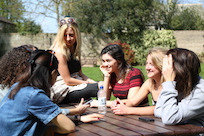
Both primary and secondary Initial Teacher Education (ITE) run by the partnership were judged outstanding in the latest inspection report, published today, with both courses gaining the top grade in every category.
Inspectors found that members of the University of Cambridge Initial Teacher Education partnership, led by the Faculty in conjunction with some 185 schools in the East of England and North London, “share the very highest aspirations for trainees”.
Unwavering commitment
Their report added: “School leaders and mentors, trainees, NQTs [newly-qualified teachers in their first teaching posts] and the central partnership team display an unwavering commitment to securing the well-being and academic progress of pupils.” The quality of teaching by trainees and NQTs was consistently high, inspectors found.
Leaders of the teacher education programme also “made excellent use of the expertise and skills available across the partnership and within the university,” Ofsted said, ensuring trainees benefited from a range of “highly impressive” support. Course leaders developed “excellent relationships” with trainees and checked on their wellbeing, and trainees valued their tutors’ skilled pastoral care and the “personalised nature” of the course.
The Faculty of Education Library and its knowledgeable staff also won praise for providing trainees with “precise guidance and support”.
Dedicated and passionate colleagues
Professor Geoff Hayward, Head of the Faculty of Education, said: “The University of Cambridge’s PGCE [Post-Graduate Certificate in Education] is an outstanding course thanks to dedicated and passionate colleagues working together across the Faculty and partnership schools.
“The University is delighted with this Ofsted report which reflects the excellence of both the provision and the outcomes achieved by our fantastic beginning teachers. We remain totally committed to enabling teacher development as a core function of the Faculty of Education.”
High quality placements
Strengths of the secondary-level teacher education at Cambridge included a shared commitment with partner schools to “developing teachers who are highly skilled at integrating educational research, a profound understanding of how pupils learn, and classroom practice”, inspectors said. “Very high quality” school placements enabled trainees to put their knowledge and skills into practice, and they applied a wide range of pedagogical approaches “exceptionally well”.
Dr Shawn Bullock, who teaches on the Secondary PGCE course, said the research-based approach of the programmewas critical to its success. “The approach manifests not only in the ways in which we teach future teachers, but also in the ways in which we require our trainees to move from being consumers of educational research to creators of educational research in a short time.
“The net result is that, by the end of the course, our graduates are able to articulate clearly their reasons for teaching particular subjects in particular ways, grounded both in research-based evidence gathered from both the existing literature and, crucially, their own classroom experiences.”
Meeting the needs of all pupils
Outstanding primary-level training was underpinned by “high expectations for excellence on the part of all involved in the partnership,” inspectors found. The training programme was “very well-designed” and “provides trainees with rich opportunities to work across a variety of cultural and economic contexts. Trainees become experienced and very skilled at improving and adapting their practice to meet the needs of all pupils.”
Educational research and pedagogical training permeated the programmes, the report said, ensuring “trainees become well informed and critically reflective teachers”.
- The report will be available shortly on the Ofsted website.
- For more information, please contact Faculty of Education Communications Manager Lucy Ward on lw528@cam.ac.uk.
Professor Anna Vignoles named the UK’s most influential researcher on higher education policy.

Anna has advised numerous government departments, including the Department for Education, the Department of Business, Innovation and Skills and HM Treasury. She provided advice to the Browne Review of Higher Education Funding, the House of Commons Education and Skills Committee investigation of higher education funding, the House of Lords Economic Affairs Select Committee, as part of their inquiry into education and training opportunities for young people, and Lord Leitch's Review of Skills.
Professor Anna Vignoles nominated for prestigious policy award

Professor Anna Vignoles of the Faculty of Education has been shortlisted for a prestigious award as one of the UK’s leading researchers on education policy.
The influential higher education policy website Wonkhe nominated Anna, Professor of Education at the University of Cambridge, as one of three contenders for its “Wonk of the Year” title for 2018. The category is the most high-profile in a series of annual awards, with this year’s winners to be announced at the Wonkfest18 conference on 5 November.
Anna studies inequalities in education access and achievement and has published widely on widening participation into higher education, social mobility and on the socioeconomic gap in pupil achievement.
Wonkhe’s nomination notes that her work, which uses large-scale data sets to study achievement and outcomes, is “often controversial” with its own audience, but said her research was “compelling and demonstrates the value that data and metrics can bring to debates about the value and purpose of higher education”.
Earlier this year, she co-authored a report with researchers from the Institute for Fiscal studies for the Department for Education exploring the factors influencing graduate earnings. The study revealed subject and institution choice were very important, but that prior attainment and socio-economic background also matter. Coming from the highest socio-economic background adds around 8% to earnings compared to coming from the lowest, even if degree subject and institution are the same.
Anna has advised numerous government departments, including the Department for Education, the Department of Business, Innovation and Skills and HM Treasury. She provided advice to the Browne Review of Higher Education Funding, the House of Commons Education and Skills Committee investigation of higher education funding, the House of Lords Economic Affairs Select Committee, as part of their inquiry into education and training opportunities for young people, and Lord Leitch's Review of Skills.
Do children need riskier play? - join our debate

An expert panel chaired by Dr Jenny Gibson of PEDAL, the Faculty’s centre for research on play in education, will seek to probe beyond notions of “cotton wool-wrapped kids” and explore the evidence on the nature of modern childhood. Are we really heading from 'free range' to 'hot house'? Is Anne Longfield, Children's Commissioner for England, correct when she calls for play on prescription and claims in her report Playing Out that children lead a "battery hen existence"?
PEDAL is hosting the debate, Play at the Extremes, at Homerton College on Thursday 18 October 6-8pm as part of the University of Cambridge's Festival of Ideas. Speakers on the panel are:
• Kathryn Lester (University of Sussex – an academic who researches anxiety in children);
• Nicola Butler (Chair of Play England’s Board of Trustees and Director of Hackney Play Association – managing Homerton Grove Adventure Playground);
• Tim Gill (a researcher, writer and consultant on childhood).
• Stephen Mitchell (Chair, Parkour UK & consultant)
A second Festival of Ideas event at the Faculty of Education allows primary-age children the chance to become a university researcher. At PEDAL's popular Playful Learning Zone, on Friday 26 October 10am-1pm, children can take part in playful research activities and experiments led by our students and researchers. Meanwhile grown-ups can look around the Faculty’s observation laboratory to discover how psychologists observe, film and code behaviour.
This half term drop-in event is FREE, and there’s no need to register - just come along any time between 10am and 1pm. You’ll need to stay with your children during this event but there is a cafe on site that serves great coffee, snacks and lunch.
• Play at the Extremes - Thursday 18 October, 6-8pm.
The Auditorium, Mary Allen Building, Homerton College, Hills Road, CB2 8PH (next to the Faculty of Education)
Refreshments will be served. Registration essential for admission, FREE tickets issued on a 'first come, first served' basis.
• Playful Learning Zone – Friday 26 October, 10-1pm. FREE.
Faculty of Education, University of Cambridge, 184 Hills Road, Cambridge, CB2 8PQ
BA in Education and Psychology wins British Psychological Society accreditation

Psychology and Learning is one of three course options, or “tracks”, open to students who choose the undergraduate degree in Education at Cambridge. The track focuses on education, human development and learning throughout the lifespan in a variety of social and cultural environments. Students use psychological theory and methods of investigation, to explore people’s intellectual, social and emotional development from birth through to adulthood.
Students completing BPS-accredited undergraduate courses become eligible for the Society’s Graduate Basis for Chartered Membership (GBC). The GBC is a prerequisite for many Society-accredited post-graduate programmes in Psychology, which in turn lead on to a career as a psychologist.
The new accreditation applies to students currently studying for the Cambridge course, which launched in the 2017/18 academic year.
Dr Sara Baker, Senior Lecturer in Psychology and Education, said: “We are absolutely delighted that our new course has been recognised with the top mark of quality by the BPS. Our teaching team have worked hard to create a programme of study that combines both education and psychology topics in an innovative, hands-on curriculum. We already have a fun group studying with us, and we look forward to reading the flood of applications that the accreditation will no doubt bring!”
Faculty experts to advise on global drive for girls' education
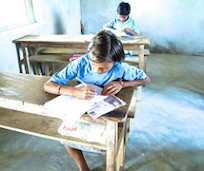
The group of 12 influential global figures, co-chaired by British Foreign Secretary Jeremy Hunt and Kenyan Cabinet Secretary for Education Amina Mohamed, will promote the goal of 12 years of quality education and learning for every girl.
The campaign will continue throughout the UK’s 2018-2020 term as Commonwealth Chair-in-Office, and will focus primarily on the needs of developing countries where marginalised girls are most likely to be missing out on a quality education.
Researchers from the REAL Centre at the Faculty, which pioneers research into overcoming barriers to education, have been chosen to provide reports presenting evidence on the constraints to girls’ education, and on what works to tackle these constraints. The focus will be on on Commonwealth countries, which are home to around half the children out of school globally.
Following the announcement of the campaign by Prime Minister Theresa May at the UN General Assembly, the first meeting of the new Platform took place in New York last week. The initiative will seek to galvanise political will to deliver on commitments to girls’ education made at the Commonwealth Heads of Government Meeting (CHOGM) 2018.
Using evidence from the REAL team and elsewhere, it will highlight examples of best practice to showcase success in girls’ education in order to promote further commitments and action in the run-up to the next CHOGM meeting in Rwanda in 2020. The REAL Centre will produce a report ahead of CHOGM 2020 setting out progress achieved and further action required to meet relevant commitments under the 2030 Sustainable Development Goals.
Professor Pauline Rose, Director of the REAL Centre, said: “It is exciting to see the global momentum around girls’ education, with the Platform represented by influential advocates of education including Julia Gillard, former Prime Minister of Australia and current Chair of the Global Partnership for Education, as well as key female leaders in Commonwealth countries including the President of Trinidad and Tobago, Paula-Mae Weekes, and Ministers of Foreign Affairs from countries such as Ghana and Rwanda.
We hope our reports will give Platform members the evidence they need to translate their strong political commitment into real change for the most marginalised girls who are currently being denied a good quality education.”
• Find a full list of members of the Platform and their biographies here.
